

“The

WAQF-E-NAU (CENTRAL)
+44 (0)20 8544 7633
+44 (0)20 8544 7643
manager@ismaelmagazine.org editorenglish@ismaelmagazine.org editorurdu@ismaelmagazine.org




“The

WAQF-E-NAU (CENTRAL)
+44 (0)20 8544 7633
+44 (0)20 8544 7643
manager@ismaelmagazine.org editorenglish@ismaelmagazine.org editorurdu@ismaelmagazine.org

To subscribe to the Isamel Magazine contact your National Secretary Waqf-e-Nau
UK- Anas Ahmad Rana waqfenau@ahmadiyyauk.org
Canada - Basil Raza Butt waqfnau@ahmadiyya.ca
USA - Mirza Harris Ahmad national.wn@ahmadiyya.us
Australia - Ataul Awal nsahmad@hotmail.com
Spain - Qaiser Malik qaismalik10@gmail.com
Belgium - Munir Ahmed Anjum waqfe.nau@ahmadiyya.be
Ghana - Hafiz Abdullah Mohammad sani waqf-e-nau@ahmadiyya.org.gh
Switzerland - Jariullah Zafarullah waqfenau@ahmadiyya.ch
Ireland - Attaur Rehman Khalid waqfenau@islamahmadiyya.ie
Mauritius - Mohsin Ahmad Ramjeet waqfenaumauritius@gmail.com
Sierra Leone - Shahid M. Korjie waqfenau.sl@gmail.com
New Zealand - Muhammad Yaseen yasinsec681@hotmail.com
France - Maqsood-ur-Rehman mrehman@hotmail.fr


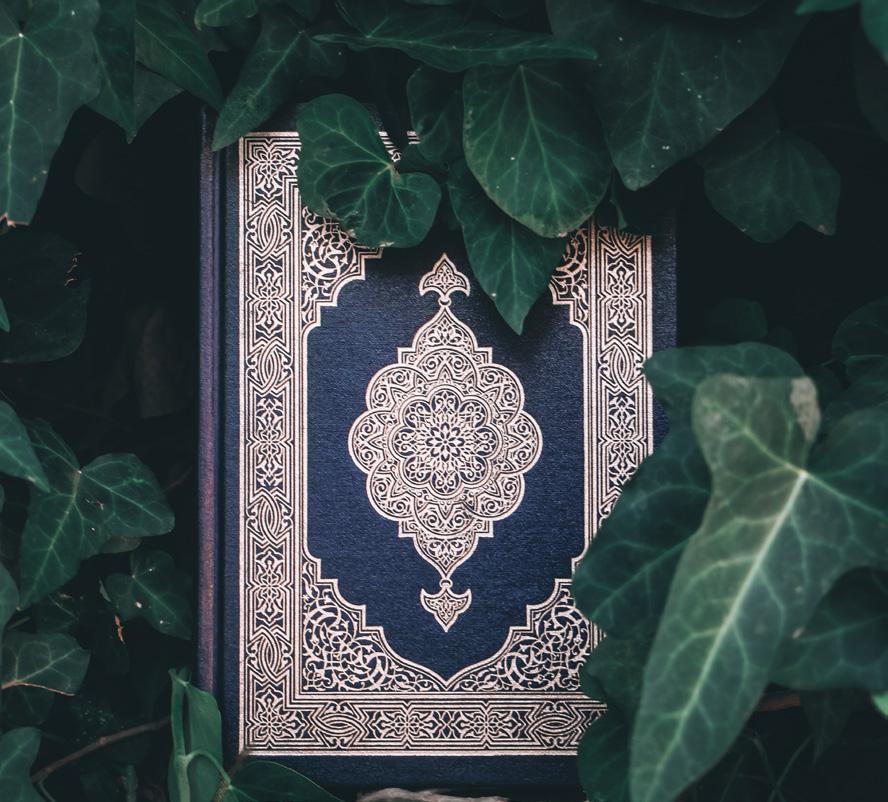
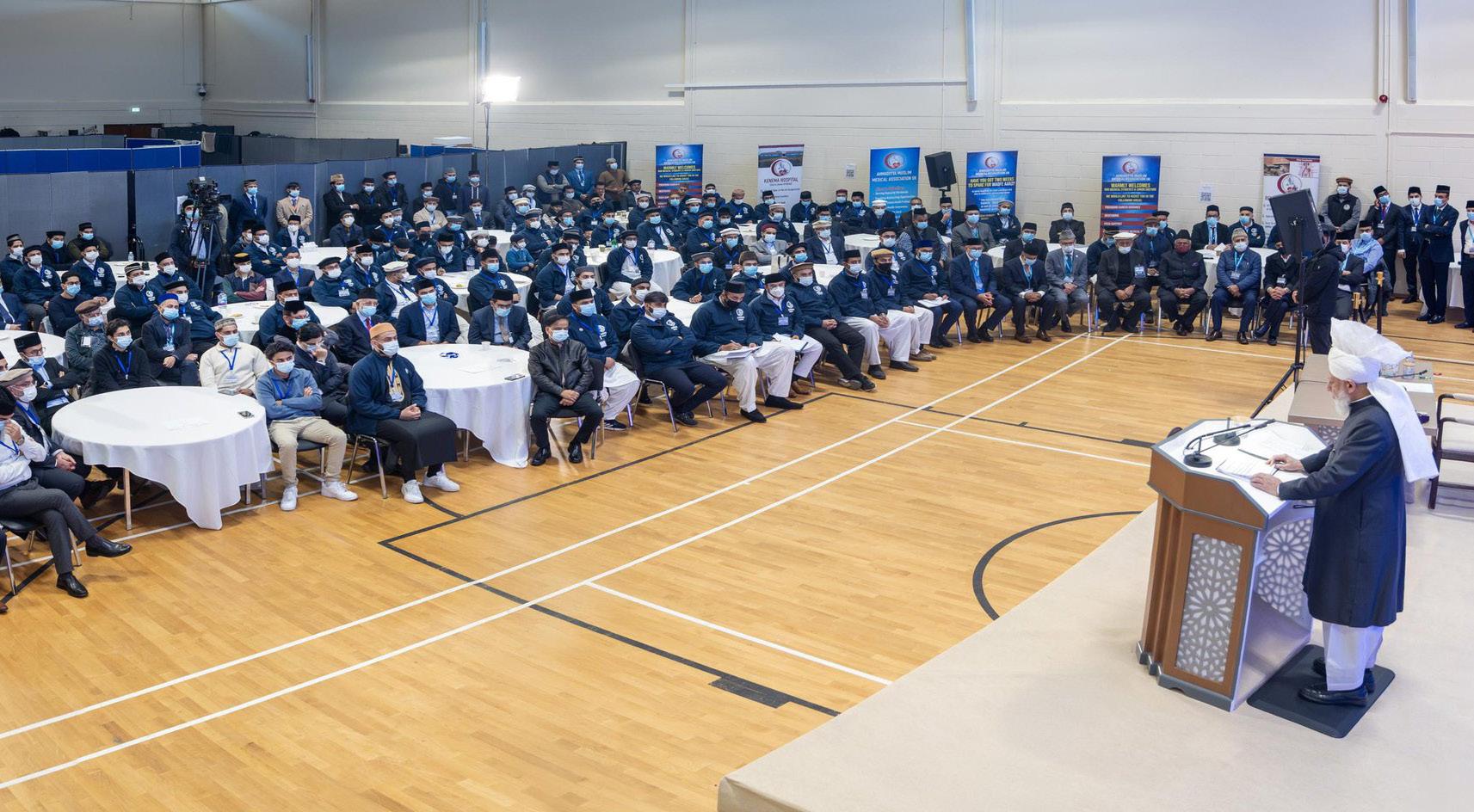

Maulvi Abdullah Rauf Omoyele Sahib
Proof of the Existence of Allah the Almighty from Nature
Muhammad Idrees Chaudhary Sahib
A Historic Trip: Waqf-e-Nau USA Visits Qadian Mirza Harris Ahmad Sahib
Ask a Murrabi Tariq Azeem Sahib
Our beloved Waqf-e-Nau Shehryar Rakin from Bangladesh
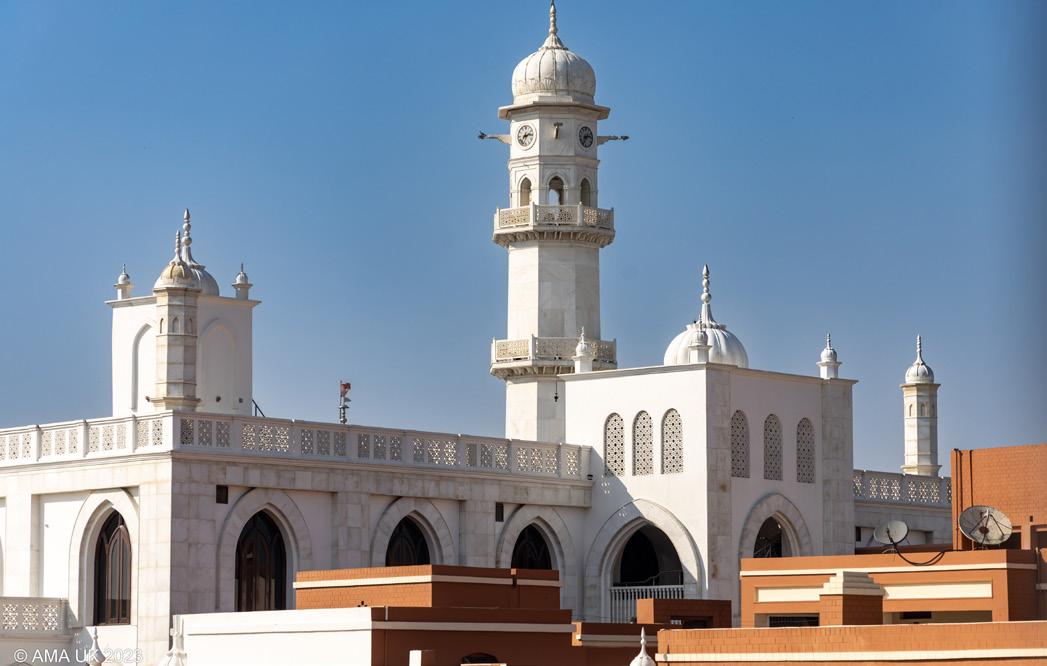
Chief Editor & Manager: Luqman Ahmed Kishwar
English Editor: Talat Syam
Urdu Editor: Farrukh Raheel
Editorial Team: Touqeer Tanvir
Farukh Arshad Talat Syam
Content manager: Noman Ahmed
Cover design: Ehtesham Arif
Farhad Ghaffar
Designing Team:
Talat Syam (Lead Designer)
Labeed Mirza
Ehtesham Arif
Danish Ahmad
Proofreading: Sadiq Ahmed
Dr Mahmood
Jalees Khan
Printers: Warners Midlands


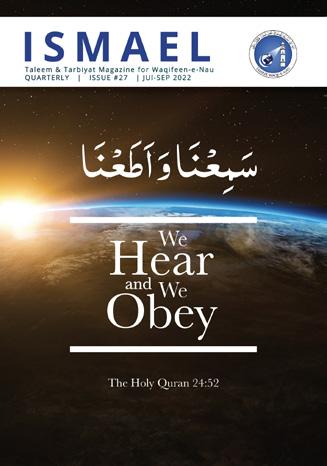

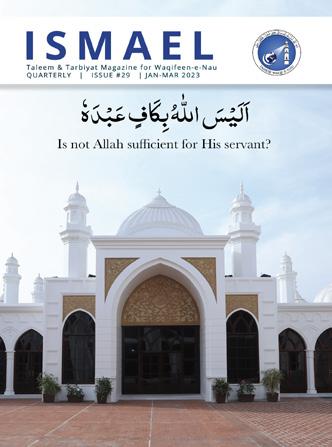
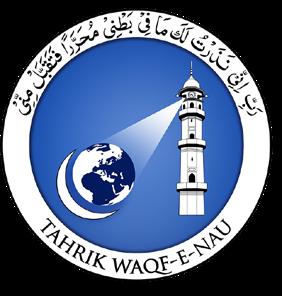
By the grace of Allah Ta'ala, Waqifeen-e-Nau are now spread across the globe, many of whom are studying in their respective fields while others have already fulfilled their pledge of dedicating their lives for the Jama’at. There are many who are Missionaries, practising Doctors, Television producers, Architects, Graphic designers, Engineers, Accountants and much more.
Ismael is an international magazine, which was launched in 2012 by Hazrat Khalifatul-Masih the fifthaba specifically for the Waqifeen-e-Nau around the world. At this auspicious occasion, addressing the Waqifeen-e-Nau Huzoor-e-Anwaraba wrote:
“The magazine has been named as “ISMAEL”, which reminds us of the sacrifices made by Hazrat Ismaelas and by Hazrat Hajiraas who spent their lives in a desolate and barren place and instituted exceptional standards of sacrifices for the sake of religion. Likewise, it is expected of every Waqf to uphold the covenant of Waqf (dedication) made by their parents even before their birth, who have in turn themselves reaffirmed the same.”
Waqifeen-e-Nau can contribute by sending articles regarding their respective fields of studies. This magazine is published on a quarterly basis as a platform for the Waqifeen-e-Nau to get in touch and express what they have always wanted to. To subscribe to this magazine, you can contact your National Waqf-e-Nau Secretary. You can also read the magazine online at: www.waqfenauintl.org/resources/ismael
Remember, this magazine is for the Waqifeen-e-Nau, prepared by the Waqifeen-eNau. Everyone is welcome to send their articles, contributions and comments. Ismael magazine is the central magazine for Waqifeen-e-Nau from around the globe.
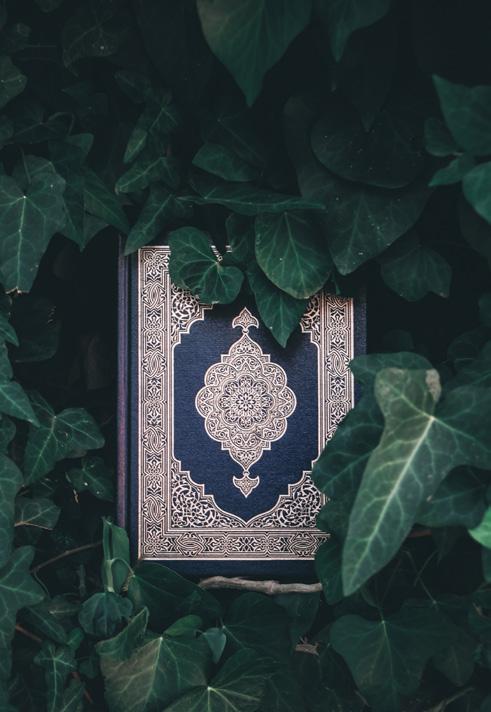
And surely have the Messengers been mocked at before thee, but that which they mocked at encompassed those of them who scoffed. Say, ‘Go about in the earth, and see what was the end of those who treated the Prophets as liars.’
The Holy Qur'an 6:11-12
Abdullah bin Amr, God be pleased with him, relates that the Holy Prophet, peace and blessings of Allah be upon him, said: ''Surely things will happen to my people as happened earlier to the Israelites. They will resemble each other like one shoe in a pair resembles the other to the extent that if anyone among the Israelites had openly committed adultery with his mother, there will be some who would do this
(Jami`
in my ummah (people) as well. Verily, the Israelites were divided into 72 sects, but my people will be divided into 73 sects. All of them will be in the Fire except one.'' The Companions asked, 'Who are they, 0 Messenger of Allah?' The Holy Prophet, peace and blessings of Allah be upon him, said: ''They are the people who will follow my practice and that of my companions.''
at-Tirmidhi, The Book on Faith, Chapter: What Has Been Related About The Splitting That Will Occur In This Ummah)
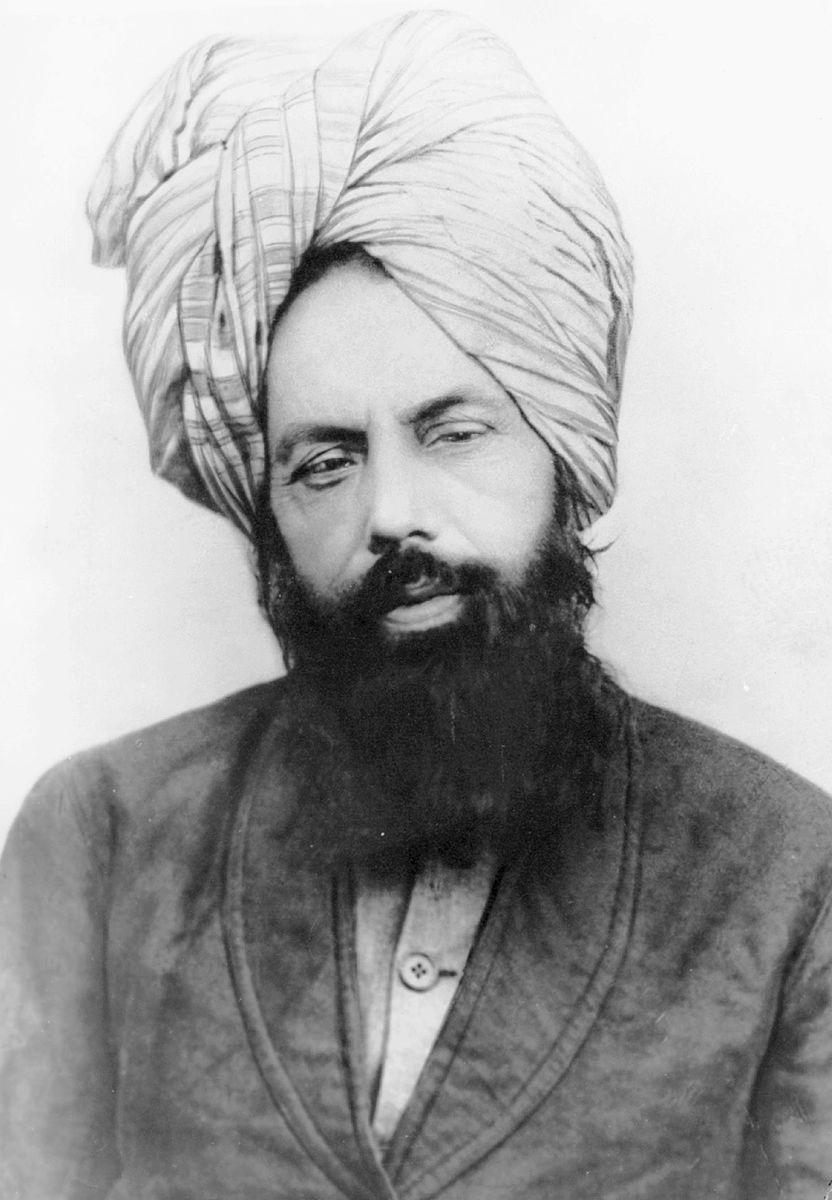
The Promised Messiahas writes:
Meaning that: I shall humiliate him who designs to humiliate you. This prophecy has been fulfilled against hundreds of my enemies. This book is not enough to accommodate all the details. A great many of these people remarked about me, ‘He is an impostor and will die of the plague’, but through God’s power, they themselves died of the plague. There are a great many who put forth their ‘revelation’ that God had informed them [about me] that this man would die soon. Glory be to God that they themselves died shortly after such of their ‘revelations’. Still others
had prayed against me that I may soon die, but they themselves died very soon thereafter.
People might recall the revelation of Maulawi Muhy-ud-Din of Lakhukay, who proclaimed that I was a disbeliever and had likened me to Pharaoh, and had published his ‘revelations’ about the torment that was to befall me. In the end, he himself died, and it has now been several years since he departed from this world. Maulawi Ghulam Dastagir of Qasur had similarly crossed all limits in hurling abuses at me. He had procured edicts of disbelief against me from Makkah.He, too, would pray against me day in and day out, and
they were iniquitous, God Almighty granted Muhammad Tahir’s prayer and destroyed them in the very lifetime of Muhammad Tahir. Therefore, Ghulam Dastagir became inspired by reading this tale and thought that he, too, should pray against ‘this false Mahdi and Masih’ so that my death would prove his ‘miraculous power’. But he failed to remember the following couplet of Sheikh Sa‘di:
‘The curse of Allah be upon the liars’ was his routine invocation. But that was not all.
As I have just pointed out above, he also became eager to pray against me in a vain effort to emulate Sheikh Muhammad Tahir, the author of Majma‘ul-Bihar so that his miraculous power be proven. During the time of the author of Majma‘ul-Bihar, some foul-natured people had claimed to be the Mahdi and the Masih out of sheer imposture. Since
“Think not every jungle uninhabited; Tread easy, it may be that a leopard sleeps”
Had I been an impostor, I would have certainly died in response to such a prayer that was offered with great concentration and fervour, and Miyan Ghulam Dastagir would have been considered Muhammad Tahir, the Second. But since I was truthful, Ghulam Dastagir fell prey to the revelation of God Almighty:
[I shall humiliate him who designs to humiliate you.]
And the eternal disgrace which he had wished for me, backfired upon his own self.
(HAQIQATUL-WAHI - THE PHILOSOPHY OF DIVINE REVELATION 428-429)
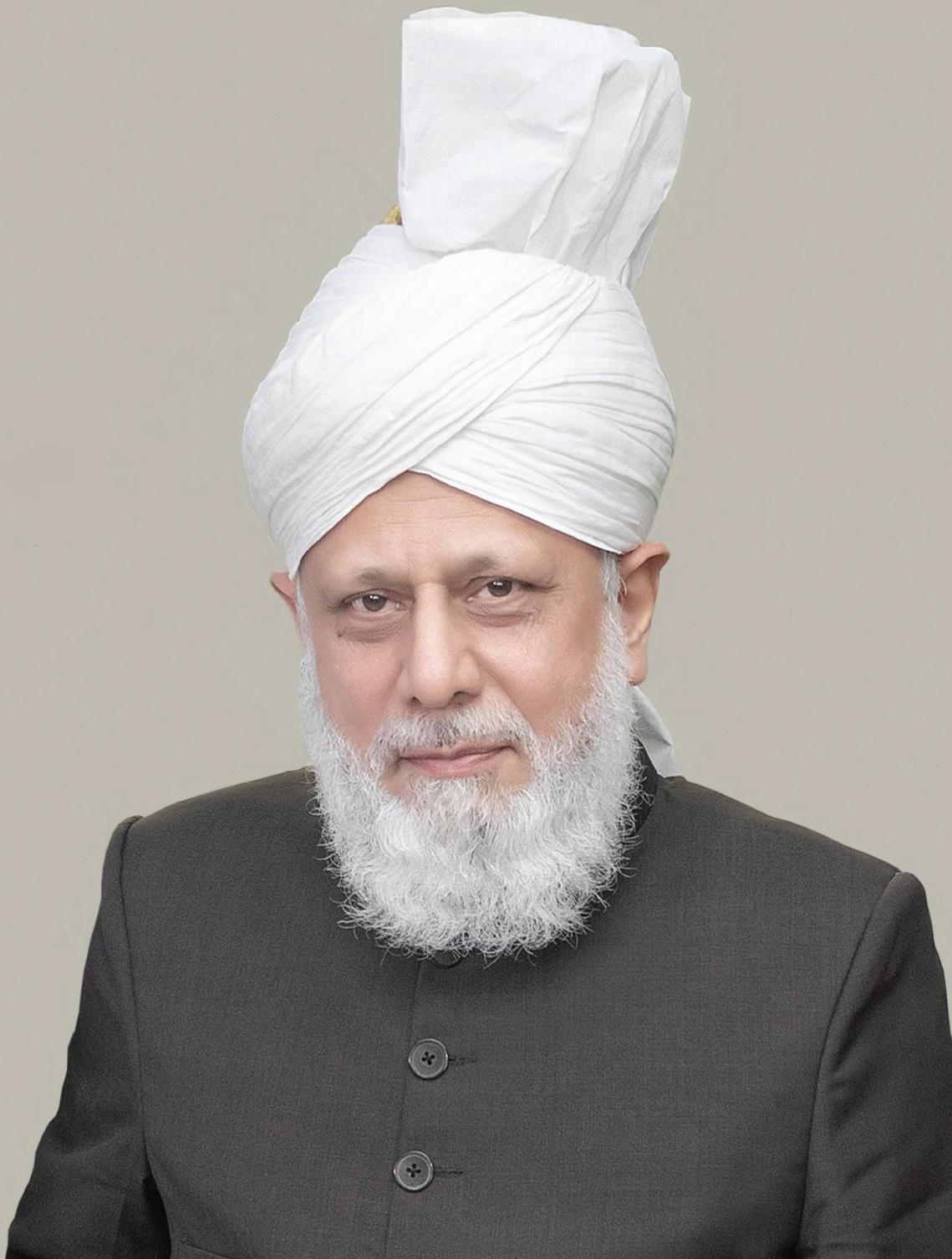
During the virtual mulaqat of students of Jamia Ahmadiyya Indonesia with Hazrat Khalifatul Masih Vaa, on 31 October 2020, a student said, “Nowadays, there are many people who mock the Promised Messiahas. How should we respond to them?”
Upon this, Huzooraa said:
“Firstly, Allah the Exalted Himself said to the Promised Messiahas:
“Thus, Allah the Exalted Himself shall deal with those who intentionally act in this manner however He desires, whether it is by humiliating them in this world, in the Hereafter or by humiliating their progenies.
“However, our response in this regard is simply that which has been explained to us by the Promised Messiahas, namely that you must demonstrate patience and you must not respond to the aggressor in an aggressive manner. You must not respond with violence. Even if you have unbounded love for the Promised Messiahas, you still must not respond with violence.
‘I shall humiliate him who seeks to humiliate you.’
“The most beloved person to us is the Holy Prophetsa. He is dearer to us than even the Promised Messiahas. Recently, caricatures of the Holy Prophetsa were made in France and some other European countries in order to ridicule him. However, what has our response been to this? We respond by invoking durood upon the Holy Prophetsa as much as possible. When we invoke durood upon the Holy Prophetsa, we also invoke durood upon the aal [progeny] of the Holy Prophetsa. They are also included in that prayer. And the greatest aal of the Holy Prophetsa is the Promised Messiahas. He is the foremost to be counted
among the aal of the Holy Prophetsa
“Therefore, whenever anyone ridicules the Holy Prophetsa or his most ardent servant, the Promised Messiahas, our first duty is to recite durood. Secondly, your conduct should be so exemplary that it silences those who ridicule and mock. They will observe that they ridicule and mock us, yet we continue to convey to them the true teachings of Islam. And we are those who spread love and affection. They will notice that despite them showing hatred towards us, we speak to them with love and affection.
“The Holy Quran also states:
“In other words, if one exhibits good morals and conduct, then those who bear enmity against you will become your warm friends.
“May we see happiness and joy. It is a source of great joy for us when the Holy Prophetsa is honoured in this world. Similarly, it is a source of great happiness for us when the Promised Messiahas, who was the most ardent devotee of the Holy Prophetsa, is honoured.
“Therefore, we should pray that we may witness their honour and respect being established in this world so that it brings us happiness and joy. We are to seek everything from Allah. We are not to take up sticks, rifles, tanks or knives. We are not going to do any such thing. We are simply going to prostrate before Allah, improve our own conditions and recite durood as much as possible.”
“Therefore, our response is to simply improve our own conduct and conditions, excel in our spirituality and prostrate before Allah the Exalted. We should pray to Allah the Exalted to improve their conditions and pray that if Allah the Exalted deems that they will not change their attitude, then may He grant us respite from them and silence them so that they do not mock or ridicule our loved ones, whether it is the Promised Messiahas or above him, the Holy Prophetsa.
Al Hakam: Answers to everyday issues – Part IV, 11th December 2020

On 27th October 2024, over 250 members of the AMMA (Ahmadiyya Muslim Medical Association) held their international conference in Islamabad, Tilford. His Holiness Hazrat Khalifatul Massih Vaa delivered the keynote address on this occasion
After reciting Tashahhud, Ta‘awwuz and Bismillah, Hazrat Khalifatul Masih Vaa said:
‘Alhamdulillah, I am pleased that Ahmadi doctors from around the world have joined together at this conference to collaborate and explore new and better ways to fulfil the objectives of the Ahmadiyya Muslim Medical Association.
Apart from sharing your own experiences, I am sure you will have presented ideas and developed plans for broadening the scope of your activities and services worldwide. Certainly, I hope and pray that you have formulated concrete plans or will formulate concrete plans to enhance your support for the Jama’at’s medical institutions and to further your efforts to serve humanity. Furthermore, I hope you will have contemplated how you can extend help and be of benefit to vulnerable Ahmadis who are battling illness or facing health challenges.
With the grace of Allah, our medical associations in some countries are doing excellent work. For example, according to the reports I receive, Australia Jama’at’s medical association is ahead of others in treating patients and equipping Jama’at hospitals with essential equipment and machinery. Whenever I have referred any case to them for their expertise and advice, they have, without hesitation, either pledged to treat the individual, finance the cost of their treatment, or to consult on behalf of the patient with relevant experts and ensure that every avenue is explored to provide them with relief and support. Similarly, they provided a significant amount of medical equipment to our hospitals in Africa and Rabwah. Moreover, for several years, they have pro-
vided medical assistance to Ahmadi refugees living in countries such as Malaysia, Thailand, and the Philippines whilst their asylum cases are pending.
Their unwavering commitment to serving those facing hardship and displacement embodies the spirit of service inherent to our faith as Muslims. They have been able to achieve all of this even though the medical association in Australia is not especially large and nor are our doctors there particularly affluent. Yet, they have provided such valuable service as a result of their sincere desire to serve others and through meticulous planning, strategic collaboration, and the efficient utilisation of their resources. May Allah the Almighty reward them and bless their efforts. Ameen.
Thus, always remember that true service lies not in how much we have, but in how much we are willing to give and sacrifice for the sake of others.
Alhamdulillah, our Ahmadi doctors in the United States have also demonstrated a longstanding commitment to serving the Jama’at’s healthcare initiatives. They played a pivotal role in the construction of the Tahir Heart Institute in Rabwah. In this way, they directly contributed to the first-rate cardiac care that the hospital has provided to countless individuals since its opening. In addition, they have continued to support the institute by providing essential medical machinery and equipment that has helped ensure the hospital’s continued growth and effectiveness. Furthermore, with the grace of Allah, two or three Ahmadi doctors from the USA have displayed extraordinary dedication for many years by travelling to Rabwah regularly to perform surgeries and pro-

vide exceptional treatment to patients at the Tahir Heart Institute. Unquestionably, they are serving the Jama’at with the spirit and devotion expected of a Waqif-e-Zindagi. May Allah also reward them immensely for their service.
Moving forward, and in addition to the work you are currently undertaking, I now urge the Ahmadiyya Muslim Medical Association in the United States and other countries to focus on raising the standards of the Fazl-e-Omar Hospital in Rabwah. Indeed, the ambition and objective should be for the Fazl-e-Omar Hospital to become a genuine centre of medical excellence. To achieve this, new buildings will need to be constructed, and existing buildings will need to be renovated. Furthermore, modern medical equipment and machinery will need to be procured. More doctors, nurses,
and ancillary staff will need to be recruited and trained. Therefore, I urge all of you to reflect upon this and consider how you can leverage your skills, expertise, and resources to elevate the Fazl-e-Omar Hospital in a way that it becomes a genuine centre of excellence. If you can achieve this objective, you will not only impact the lives of countless individuals today but will also leave a lasting legacy for generations to come, insha’Allah.
In recent years, many Ahmadis have migrated abroad from Pakistan, and most of those left behind are not affluent. In fact, many are living in real hardship. Given the ever-rising costs of medical treatment, it is impossible for such people to afford even basic medical care. As a Jama’at, we consider Khidmat-e-Khalq to be our religious duty. We consider it our obligation to try
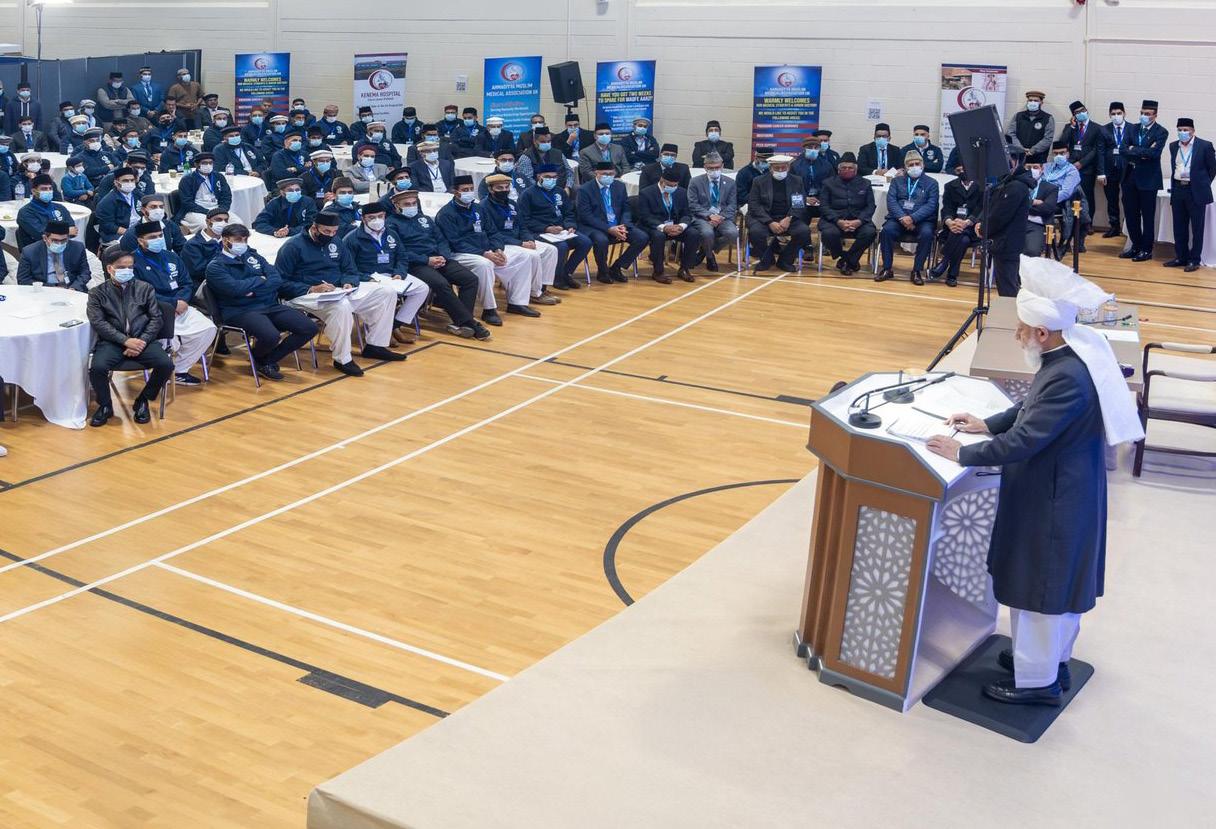
to alleviate the suffering of those in need. Consequently, a significant portion of Sadr Anjuman’s budget is allocated to helping such people and their families and insha’Allah, we will always continue to extend such help.
At the same time, the medical association of the Jama’at should consult and proactively engage with the relevant officials of the hospital administration and Nazarat-e-Sehat in Rabwah and formulate a comprehensive strategic plan for the short-term and longterm development of Fazl-e-Omar Hospital. The plan should address key areas, such as infrastructure improvement, acquisition of modern medical equipment, recruitment and training of skilled personnel, and the establishment of additional specialised departments to cater for the wide-ranging healthcare needs of the community.
Many Ahmadi doctors themselves have e pressed their opinion that the Fazl-e- Omar hospital should be developed into a state of-the-art facility. Yet, it is not sufficient to merely suggest this; rather, as doctors and as a medical association, you should be at the vanguard of translating this aspiration into a reality. So, you should work diligently on this project and send me your proposals.
One distinguishing feature of Ahmadi doctors in the United States is that apart from serving as physicians, many are also engaged in medical research, seeking to advance the boundaries of human knowledge and healthcare. Similarly, in Germany, some Ahmadi doctors and scientists are significantly contributing to advancement in cardiology. For example, they are developing and manufacturing stents at a very low price. Initial results have been extreme-
ly promising and the stents are proving of benefit to patients. The German Ahmadi doctors and scientists are also travelling to Rabwah and Africa with great sincerity to treat patients and provide healthcare to the local people. May Allah reward them immensely and further enhance their knowledge and understanding.
Perhaps some Ahmadi doctors or medical professionals elsewhere are also engaged in similar research but have not informed the Markaz [headquarters]. Anyway, those Ahmadis engaged in medical research should extend their fields of study to investigate the specific healthcare challenges faced by those living in economically deprived countries. Explore innovative solutions, develop cost-effective treatments, and strive to contribute to the development of sustainable healthcare systems that cater to the needs of the most vulnerable populations.
Moreover, as I have stated many times, the world’s geopolitical situation is extremely precarious, and we are living in a time of grave uncertainty. Conflicts and wars are rapidly escalating, and if, God forbid, a world war erupts, the resulting humanitarian crisis would be of an unimaginable scale. While we continue to pray that such a war may be averted, we must also ensure that we have planned for all eventualities. Therefore, I urge our medical associations in the United States and elsewhere to proactively develop comprehensive contingency plans. They should detail how our Ahmadi doctors and medical teams could efficiently utilise their skills and expertise to serve humanity in the event of a global crisis.
Moving on, regarding the efforts of the UK medical association; some years ago, they pledged to build a hospital in the Ivory Coast. However, as the actual scope of the

project dawned on them, they developed reservations about whether they could build and run such a hospital. In the end, they withdrew from the project, although they contributed some amount. Thereafter, Humanity First took ownership of the hospital project. Nonetheless, Humanity First has expressed its disappointment that the UK medical association withdrew completely and did not fulfil its pledge. Irrespective of what happened in the past, I hope and pray that the hospital in Ivory Coast is soon completed and that it proves to be a means of providing high-quality healthcare to the local people, insha’Allah.
The key to the success will be ensuring its sustainability, as the hospital is due to house various departments and provide a range of treatments and procedures. It is
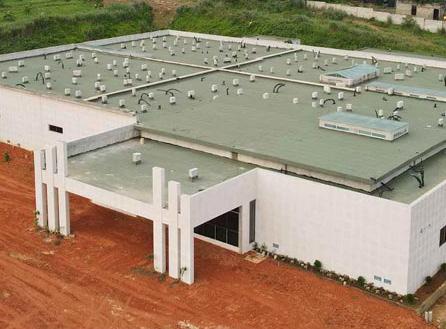
unlikely that the hospital will be self-sufficient in the near future, as it is being built in an economically deprived country where most people will be unable to pay the cost of their treatment. Accordingly, where Humanity First is exploring ways to ensure its long-term sustainability, I hope the UK Jama’at medical association has not entirely washed its hands from this project. Rather, even if it is no longer involved in the construction of the hospital, the UK medical association can and should make a valuable contribution post-construction.
One practical and impactable way to contribute is to arrange for Ahmadi doctors and medical professionals to travel to the Ivory Coast regularly to offer their services as a Waqif-e-Arzi [dedicating one’s services temporarily] doctor. This would not only
reduce some of the financial burden, but also ensure that the hospital has a strong foundation of medical expertise, enabling it to thrive and serve the community effectively, insha’Allah.
After this experience, you should not think it is unrealistic or beyond your capabilities to build such hospitals in Africa or other developing regions. In recent times, Majlis Ansarullah UK has constructed the Masroor Eye Institute in Burkina Faso and also built a general hospital. With the grace of Allah, Ahmadi doctors, including eye specialists from the UK, are travelling there regularly to offer their services and to train local doctors. Those travelling from the UK are not just doctors from Majlis Ansarullah, but also include doctors from Khuddamul Ahmadiyya and Lajna Ima’illah. In my

view, they have been motivated and inspired to offer their service more through the efforts of Majlis Ansarullah rather than the UK medical association.
Certainly, to ensure a constant flow of Ahmadi doctors, travel to such countries as a Waqf-e-Arzi doctor requires a sustained effort, and I think there has been a deficiency in the consistency in the efforts made by the administration of the UK medical association in this regard.
This weekend, the UK medical association has hosted this conference, and I am sure it has been well organised – and I can see it seems to be well organised – and the delegates from abroad will have been well looked after. However, remember that the true measure of our success lies not in the conferences we host, but in the impact we have on the world. Your objectives extend far beyond these walls, reaching into the most remote and deprived communities around the world. As such, the UK medical association should work passionately and diligently to fulfil its objectives of serving mankind throughout the year and strive to be a standard bearer for medical associations in other Jama’ats to learn from.
You should arrange for Ahmadi doctors to
travel abroad at regular intervals to serve in our hospitals and continually find new avenues to expand your service for humanity. You should inspire other Jama’at medical associations and
serve as a role model for them. I am not saying Ahmadi doctors in the UK are not offering their services; in fact, I am aware of many dedicated Ahmadi doctors from here who are striving to serve humanity with sincerity and compassion, and I pray that Allah may reward them abundantly for their efforts.
However, remember that collective action is the means of amplifying one’s impact. Similarly, I hope and pray that the Ahmadiyya Medical Association in those countries I have not individually mentioned continually strive to increase their efforts to serve those in need, both within our Jama’at and beyond.
May Allah the Almighty enable all Ahmadiyya Medical Associations to not only develop ambitious plans for serving humanity but also to translate those plans into tangible actions.
At the end, I wish to remind every Ahmadi doctor and medical professional that as an Ahmadi, you should always keep at the forefront of your mind that apart from fulfilling the rights of Allah, you are in a unique position to be on the frontline of serving humanity and fulfilling the rights of Allah’s creation. Do not take this lightly. Instead, consider this a huge privilege and oppor-
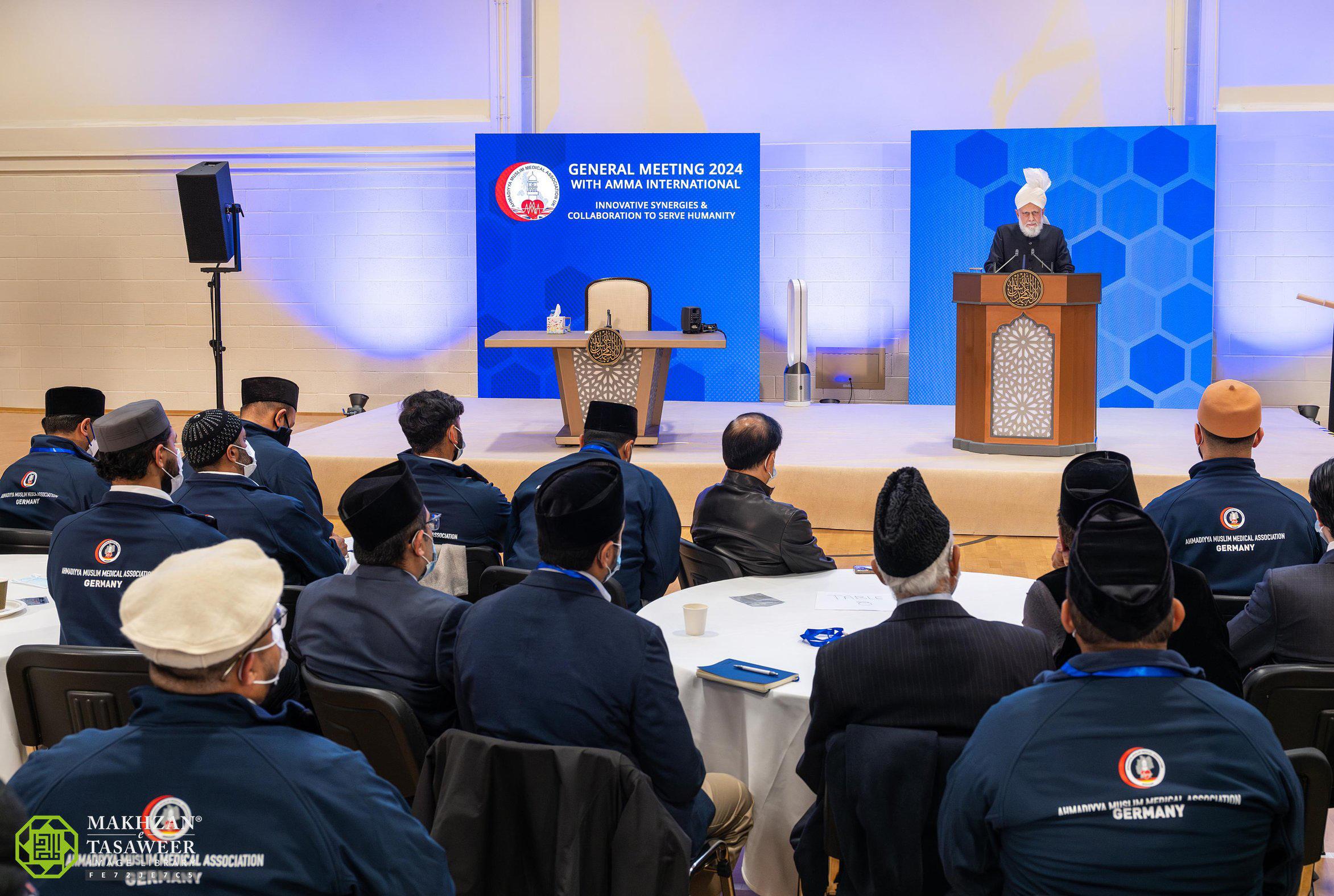
tunity to gain the nearness and blessings of Allah the Almighty. Never tire or waver in your service for others, and constantly seek new ways to contribute, to innovate, and to expand your reach.
May it be that in the coming months and years ahead you are able to demonstrate a profound and extraordinary increase in your efforts to fulfil the objectives for which the Ahmadiyya Muslim Medical Association was established. Never forget that your skills, knowledge, success, and experience are all gifts from Allah and will only be worthy of value in His eyes when utilised with selflessness for the sake of serving His creation.
May Allah the Almighty enable you to not only develop new ideas and schemes to serve humanity but also, more importantly, to fulfil them. May you serve those in need with passion, empathy, tenderness, and compassion. May you serve Allah’s creation with devotion, purely to gain His pleasure and blessings in the knowledge that whatever blessings Allah has bestowed upon you should be utilised in the service of others.
May all of you prove to be faithful servants of humanity, Ameen, JazakAllah.’
(Reproduced from official version in The Review of Religions)


No matter how powerful, wealthy or influential the enemies of truth have been, their power collapsed before the will of Allah the Almighty. Whoever opposed the humble prophets of Allah the Almighty with arrogance and hostility, has always ended up humiliated.
On the other hand, the messengers of Allah the Almighty, even when they seemed weak, overpowered or surrounded, have always succeeded with Allah’s divine support. This pattern is more than just an ancient lesson. It is proof that in the battle between truth and falsehood, truth always wins and falsehood is bound to fail.
This divine principle is formidably mentioned in the Holy Qur’an in the following verses:
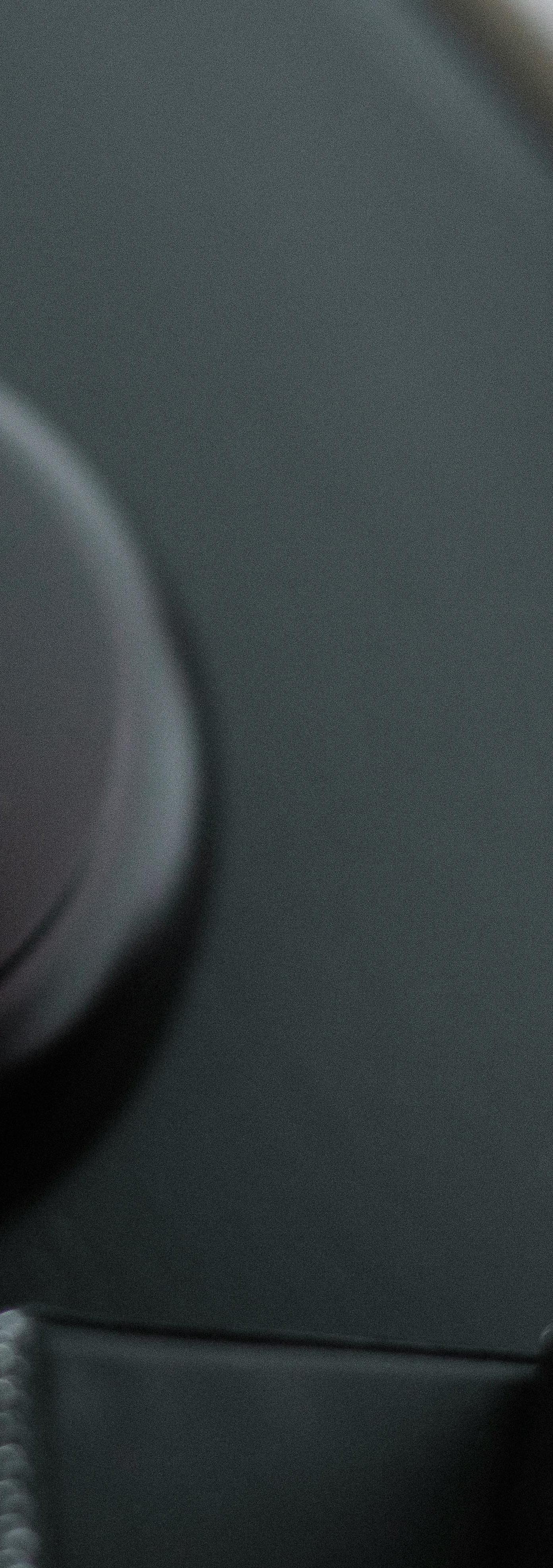
In this debate Abdullah Atham was aided by Dr. Henry Martyn Clark, a prominent Christian missionary who had challenged the Muslims to hold this debate.
The Promised Messiahas emerged victorious in the debate and the Christians were humiliated. This defeat was not taken well by Dr. Clark and he was waiting for a moment to take his revenge.
To get vengeance on the 1st August 1897, Dr. Henry Martyn Clark filed a charge of attempted murder against the Promised Messiahas in the court of the District Magistrate at Amritsar. The charge was that Hazrat Mirza Ghulam Ahmadas instructed a young man called Abdul Hamid to go to Amritsar and murder Dr. Clark.
‘‘Allah has decreed: ‘Most surely I will prevail, I and My Messengers.’ Verily, Allah is Powerful, Mighty.” (The Holy Qur’an 58:22)
“And say, ‘Truth has come and falsehood has vanished away. Falsehood does indeed vanish away fast.” (The Holy Qur’an 17:82)
In May and June 1893, a debate took place between Hazrat Mirza Ghulam Ahmad, the Promised Messiahas, and Abdullah Atham, an Indian Christian convert.
Conveniently for Dr. Clark before going to Amritsar Abdul Hamid stayed in the guest house of the Ahmadiyya Jama’at in Qadian for 14 days. Dr. Clark thought this to be a golden opportunity to pin a crime on the Promised Messiahas and presented Abdul Hamid as the key witness in support of his claim.
This complaint was immediately processed by the Magistrate at Amritsar and even an arrest warrant was issued against the Promised Messiahas. Many adversaries of the Promised Messiahas were waiting to see him be taken away in handcuffs. However the Amritsar Magistrate realised soon that since the Promised Messiahas did not reside in Amritsar, he couldn’t issue an arrest for the Promised Messiahas and he had to transfer the case to the Gurdaspur District.
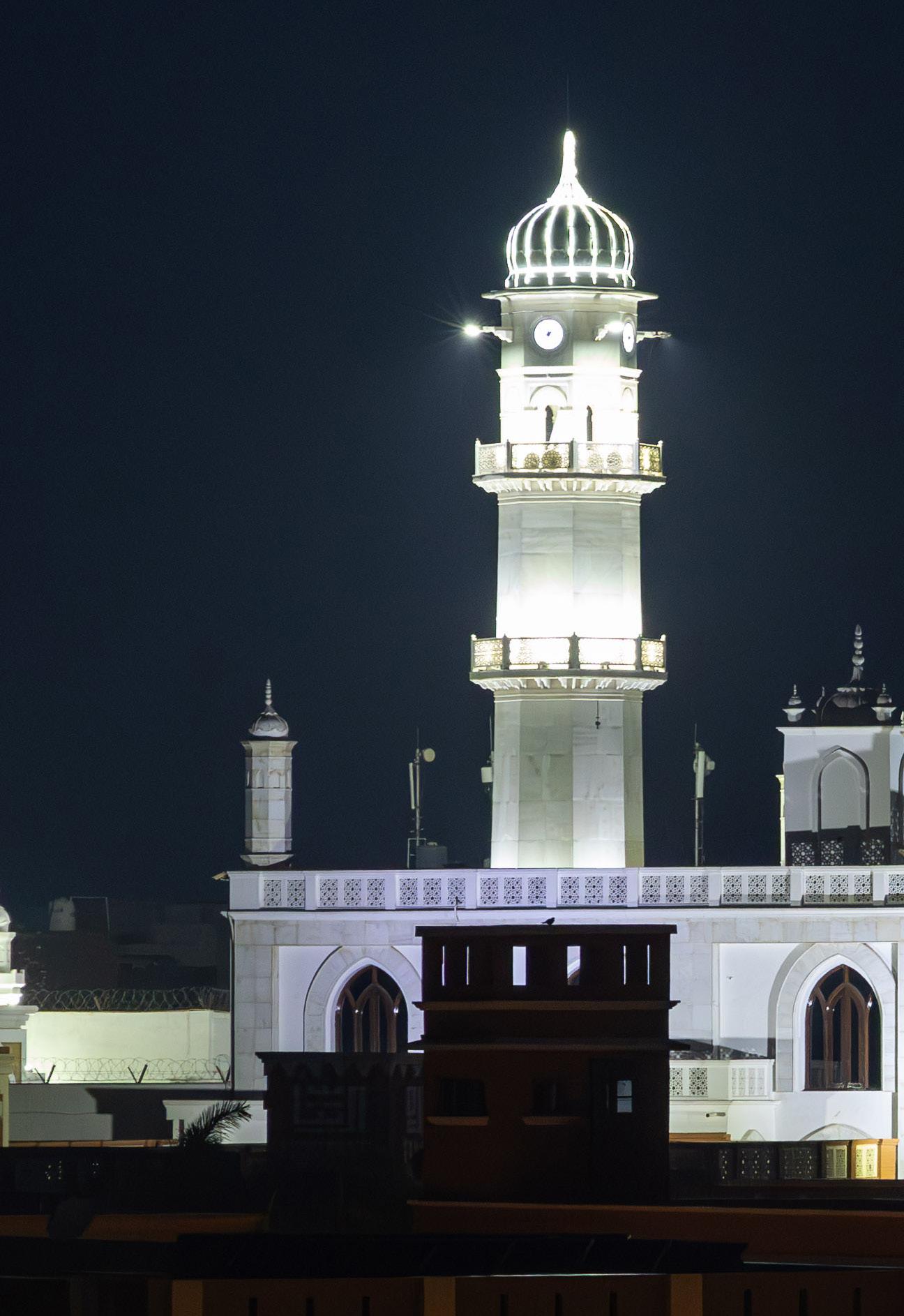
When Dr. Clark found out the case of the Promised Messiahas has been transferred to the Gurdaspur District, he immediately contacted Captain Douglas, who was the Magistrate at Gurdaspur, to have this arrest take effect swiftly.
On 10th August 1897 the Promised Messiahas was summoned to the court for the hearing. Unsurprisingly the claimant, witness and even the legal advisor of the claimant were opponents of the Promised Messiahas. Apart from Abdul Hamid, who was the main witness, Maulvi Muhammad Hussain Batalvi also offered to be a witness in this baseless allegation. And the legal advisor was a Hindu Pundit called Ram Bhaj Dutt. Hence, representatives from three major faiths came together to defeat the Promised Messiahas.
Up till this time, the opponents of the Promised Messiahas believed they were making progress and that soon, by proving that the Promised Messiahas committed a major crime, they would humiliate him and destroy his reputation as well as the foundation of his claims. However, in this court hearing they realised that, in fact, this was just another moment of the fulfilment of Allah the Almighty’s promise to the Promised Messiahas:
on a chair and he had to stand, he became furious and demanded that he should also be given a seat. Boasting about his reputation, he said that even when he visits the governor he is given a chair. Mocking his absurdity, Captain Douglas reminded him that anyone who visits the governor is offered a seat and this is not the governor’s office, this is in fact a courtroom. Upon this Muhammad Hussain Batalvi started arguing with the Magistrate but instead of a chair he was humiliated even more when Captain Douglas ordered him to be removed from the courtroom.
“Surely I will humiliate those who seek to humiliate you”
Before the Promised Messiahas entered the court, Captain Douglas had an animosity towards Hazrat Mirza Ghulam Ahmadas because he claimed to be the Messiah. However when the Promised Messiahas appeared before him, Allah the Almighty changed the condition of his heart. Instead of animosity, he showed great respect to the Promised Messiahas and even ordered that a chair be brought for him to have a seat.
Soon after, Maulvi Muhammad Hussain Batalvi, probably imagining that the Promised Messiahas would be in a pitiful state, entered the courtroom. Seeing that the Promised Messiahas was gracefully seated
When he was taken out, he saw a chair outside the room, and thought that if he sat down on that chair, the people outside would think he was probably seated inside as well. However, as soon as he sat down, the guard told him to get up and go out to the courtyard. Embarrassed again, he saw an empty space on a blanket on the floor and sat there. When the man whose blanket it was saw Muhammad Hussain Batalvi sitting on it, he harshly told him to get up from his blanket.
Wherever Muhammad Hussain Batalvi tried to sit, Allah the Almighty humiliated him, exhibiting the fulfilment of the promise Allah the Almighty had given to his beloved Promised Messiahas
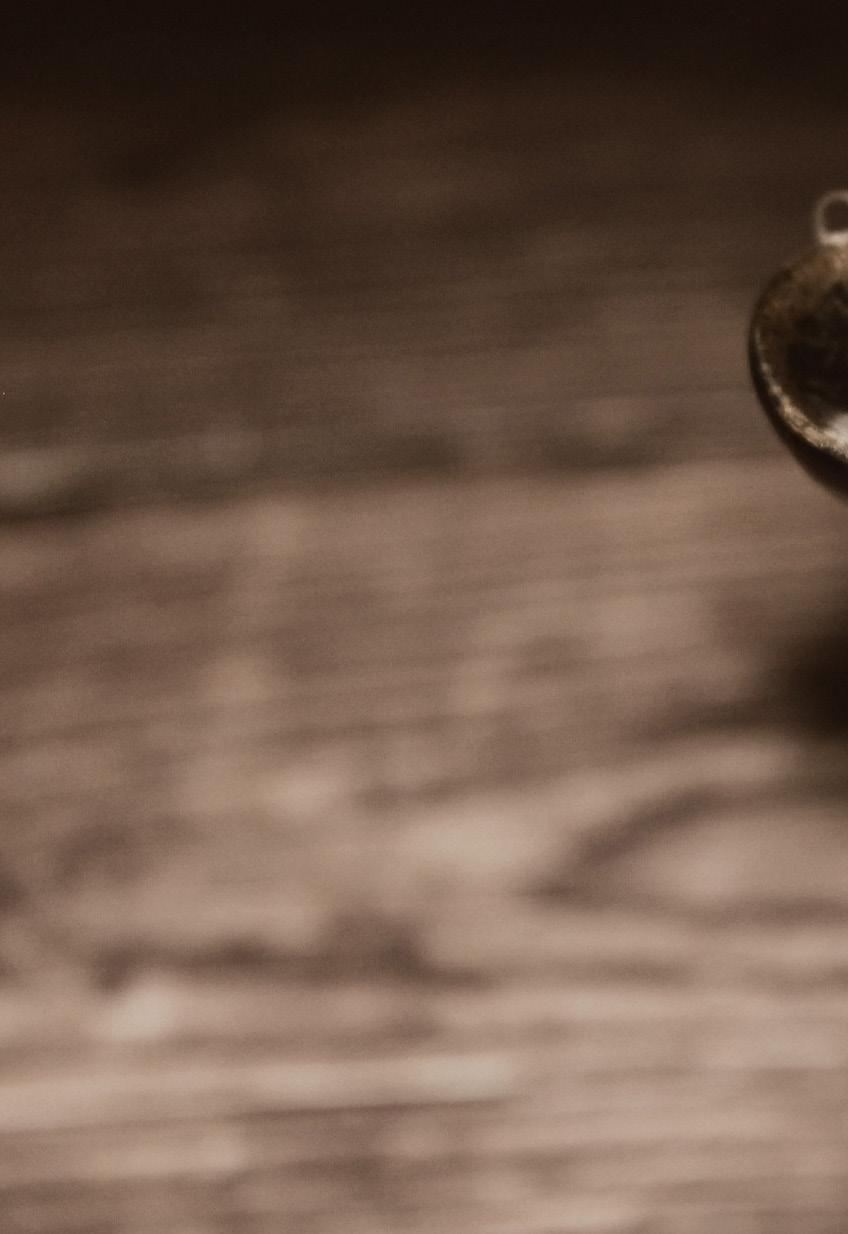
In the days before this hearing, Abdul Hamid, the main witness, was being trained by the opponents of the Promised Messiahas on what to say in the court. However, when he was taken into custody by the police just before the court date, he admitted his own guilt and disclosed to the police that he was put up for this by Dr. Clark. Since the main witness was taken out of the game, the rest didn’t hold much credibility and ultimately, by the will and grace of Allah the Almighty, on 23rd August 1897, the Promised Messiahas was cleared of all the false charges against him.
Not only this, because the Promised Messiahas was falsely accused, Captain Douglas proposed that if he wanted to, he could file a case against his opponents for the distress and anguish they have caused. However, the Promised Messiahas replied that my case will be heard in heaven and left the matter in the hands of Allah the Almighty. A most beautiful and befitting response from the one who was sent by Allah the Almighty himself, and in this he was emulating the example of his beloved master the Holy Prophet Muhammadsa.
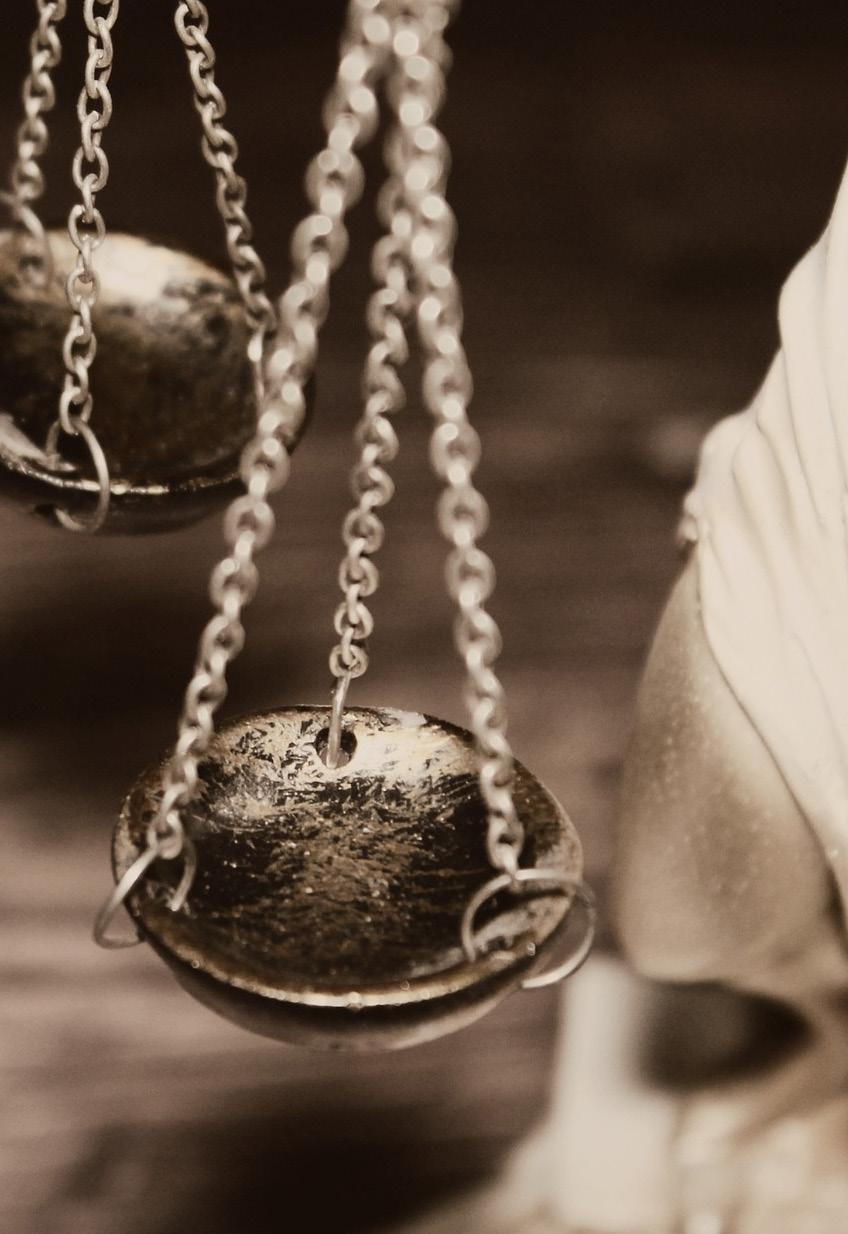
Maulvi Abdullah Rauf Omoyele Sahib

The appearance of Prophets and Messengers from Almighty the Allah has always been for the purpose of reconnecting man with their Creator after he has lost his way and inclined towards the material world. This has always been the practice of Allah the Almighty from time immemorial. He sends them with numerous clear signs in order for people to be able to recognise them. However, the people for whose guidance the appointed ones are sent generally do not welcome the coming of the Messengers. They reject their message, designate them liars, mock them and exert their utmost effort to bury their message by meting out all forms of persecutions to them. This has been the attitude of those who oppose the messengers. Allah says:
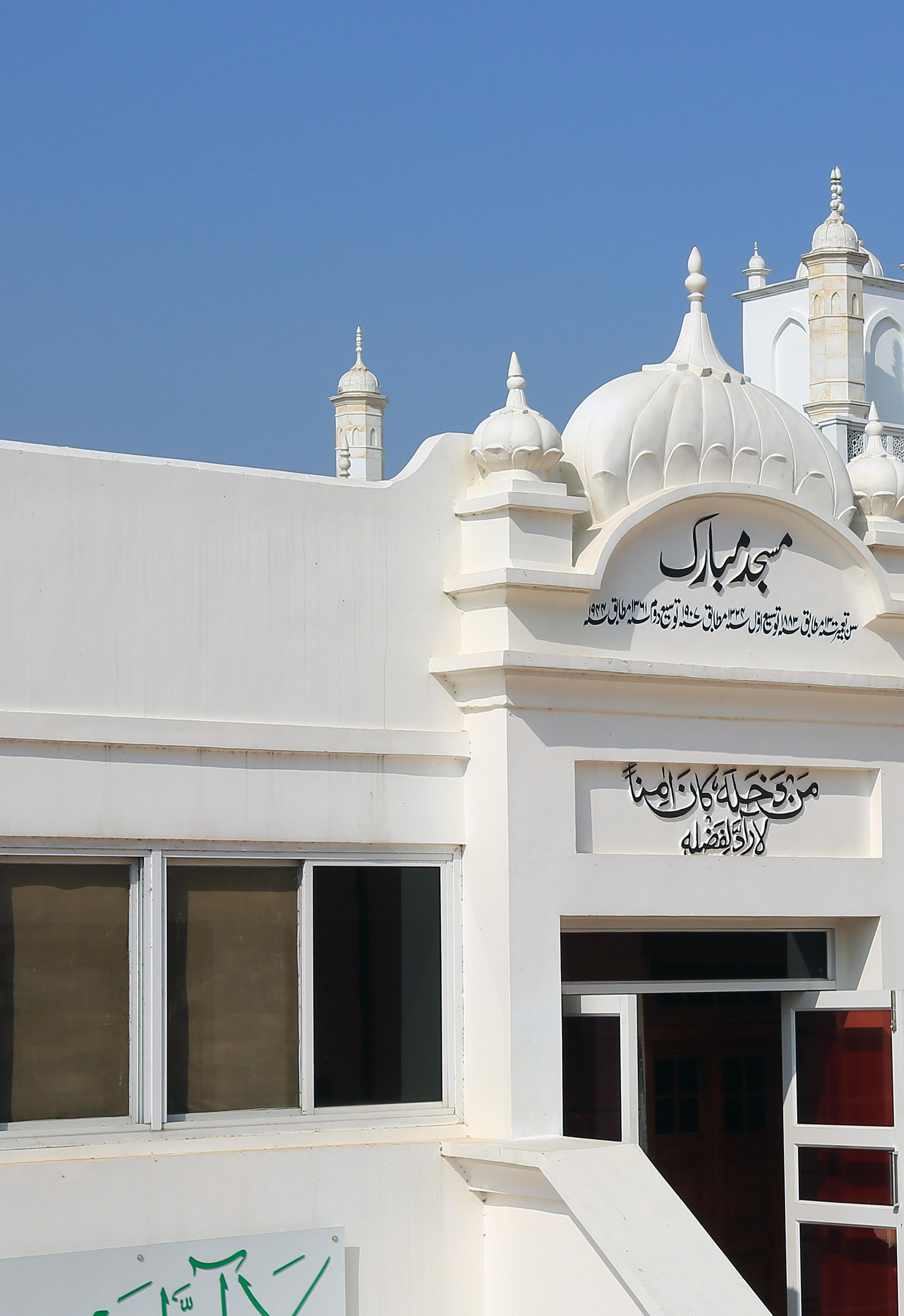
Alas for My servants! There comes not a Messenger to them but they mock at him. (The Holy Qur’an 36:31)
However, since this was to happen, Almighty Allah has always Himself protected His Messengers, firmly established them and granted them success in their mission. While humans appear to be supporting the mission of the Prophets, the reality is that it is Almighty Allah Himself Who is helping them. He Himself grants them support, honour and acceptance amongst the people while those who rejected them were disgraced, humiliated and met with failures.
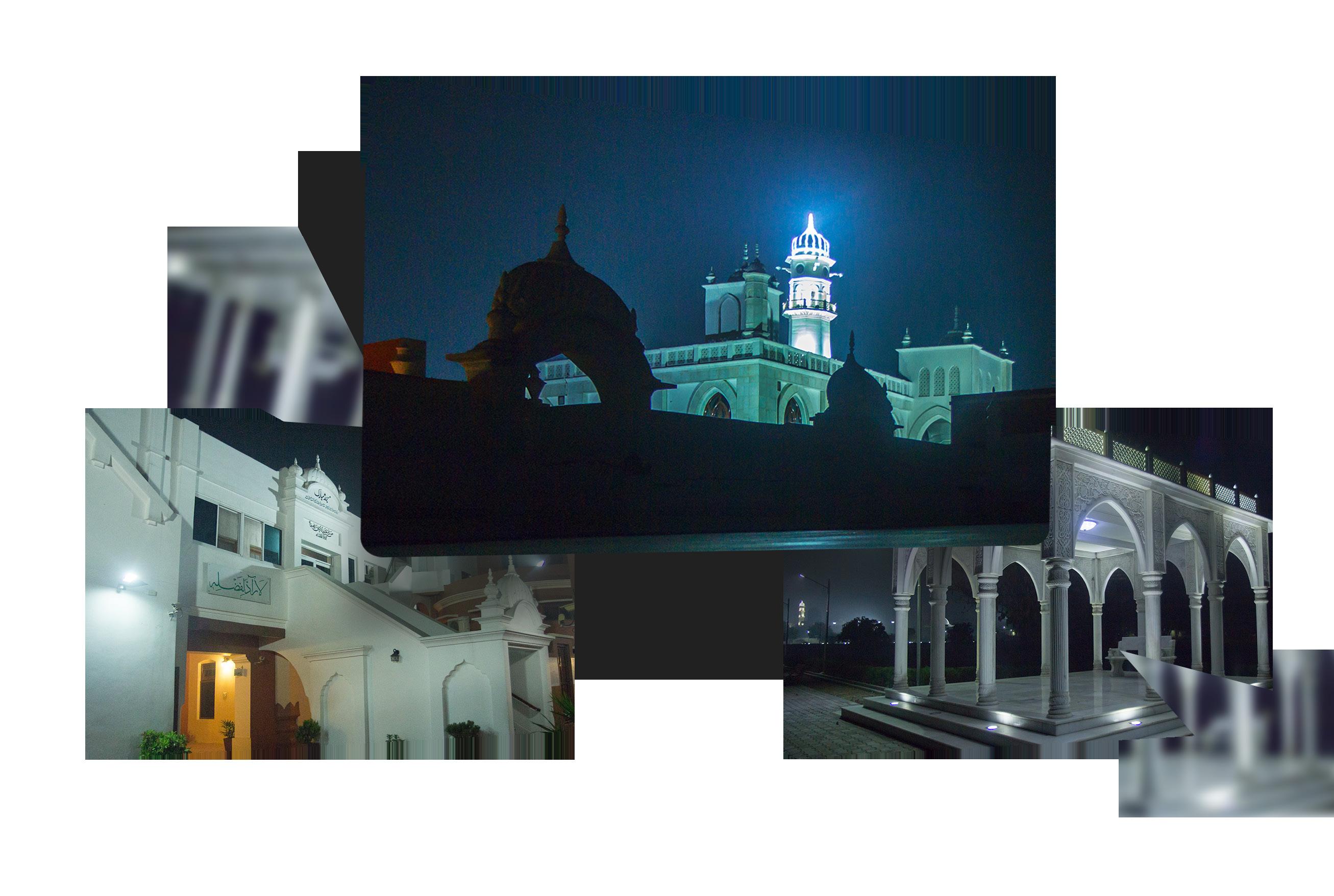
The life of the Promised Messiahas is replete with such examples. For instance, upon the publication of his book Barahin-e-Ahmadiyya, in which he challenged people of all faith, with a promise to pay 10,000 Rupees, to prove that their religious books are equal to the Holy Quran in respect of all the arguments and strong proofs that he has deduced from the Holy Quran. He further wrote that if they are not able to, they should admit their failure and try to at least refute all his arguments or at least a third of it.
Maulvi Muhammad Hussain Batalvi, a renowned scholar of the Ahl-e-Hadith sect and editor of a periodical Ishaat-us-Sunnah, published a 200-page review of Barahin-e-Ahmadiyya saying that without any exaggeration, this Barahin-e-Ahmadiyya was such an excellent book which till date is unmatched in the history of Islam. He
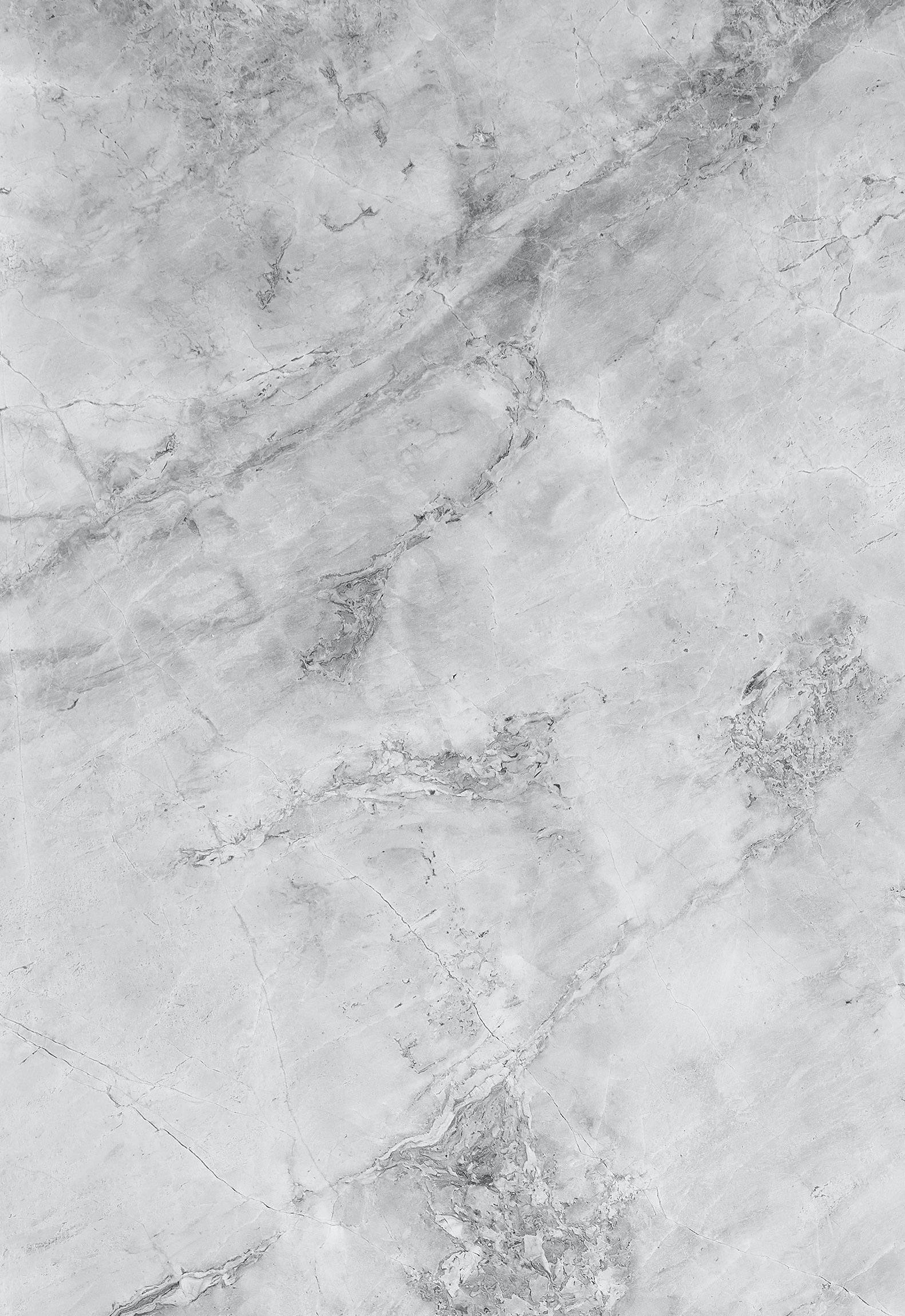
also wrote about the piety and utmost religious struggles and sacrifices of the author (the Promised Messiahas) stating that he is a witness of his pure character and virtue which were in accordance with the Sharia of Islam.
In 1891, the Promised Messiahas wrote and published a book Fath-e-Islam (Victory of Islam) in which he announced that Hadhrat Isaas about whom the Muslims erroneously believe to still be alive in the heavens is dead and that he is the one who has appeared in his name in fulfilment of the prophecies regarding the second coming.
This publication enraged Maulvi Muhammad Hussain Batalvi, who then took it upon himself as a duty to “bring down” the Promised Messiahas as he was very confident that it was the review he wrote about Barahin-e-Ahmadiyya that brought him
into the limelight as a result of which, according to him, the Promised Messiahas began to regard himself as important.
That same year, Maulvi Muhammd Hussain Batalvi prepared a Fatwa (verdict) of disbelief against the Promised Messiahas and travelled the length and breadth of India to secure the signatures of two hundred scholars on the Fatwa. He also actively dedicated his newspaper to opposing the Promised Messiahas.
On the other hand, Allah already made provisions for the downfall of Maulvi Muhammad Hussain, in accordance with His promise that He made to the Promised Messiahas that:

“Verily, I shall humiliate those who seek to humiliate you”
It so happened that the one who set out to “bring down” the Promised Messiahas, was himself brought down. He began to experience decline. The one who was usually well honoured and respected at all places he visited or passed-by began to be looked down upon and ignored.
After the publication of the Fatwa, the great regard he enjoyed among all classes of people began to decline. The decline went on until the members of his own sect decided to abandon him. He was no longer considered the leader he had once been. He lost all the respect he once enjoyed and was in a very miserable state.

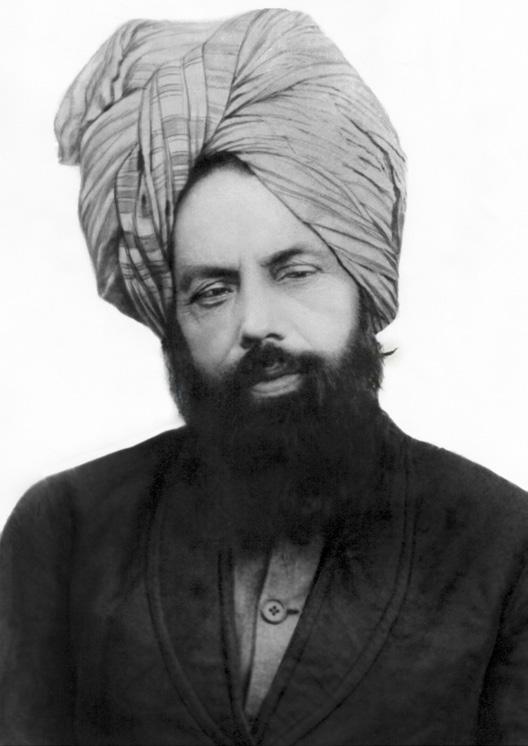
The Promised Messiahas writes:
“Sheikh Muhammd Hussain Abu Sa’eed is in a very delicate state nowadays. He considers this humble one to be a disbeliever and in his verdict of disbelief, many elders have also used the word “worst of disbelievers” for me. He has also put his elderly teacher, Nazir Hussein Dehlwi, into this trial… Witnesses say that Batalvi’s condition is wretched these days. If anybody happens to ask him as to why he does not fear God when declaring those who pronounce the kalmia to be disbelievers, he begins to hurl abuse at this humble one and describes me as a disbeliever and worst of the disbelievers.”
In another incident which was a murder case brought against the Promised Messiahas by Dr Martin Clark, Maulvi Muhammad Hussain Batalvi came to give evidence against the Promised Messiahas and was very hopeful to see the Promised Messiahas being humiliated in court. However, the Deputy Commissioner before whom the case was presented asked for a chair to be brought for the Promised Messiahas and asked for it to be placed near him for the Promised Messiahas to sit. Maulvi Muhammad Hussain Batalvi, who had come and expected to see the Promised Messiahas humiliated, upon seeing that the Promised Messiahas was seated on a chair, he also requested for a chair to sit.
However, when Captain Douglas heard this, he became enraged and said in a harsh tone, “You will not be given a chair.” Maulvi Muhammad Hussain said, “In the courtroom my father would have a chair, I should also be given a chair. I am an advocate for the Ahl-e-Hadith and I have a right to a chair.” Upon this, Captain Douglas said: “Enough with your nonsense, move back and stand up straight.”
When Maulvi Sahib came outside, in order to show the people that he had received a chair inside as well, he came outside and sat on a chair in the veranda. The clerk saw that Maulvi Sahib did not get a chair inside, but is now sitting on a chair in the veranda, he thought that if his superior officer saw this, he would be angry with him, and so he immediately went to him and said, “You do not have permission to sit here, vacate the seat.”
Overcome with anger, Maulvi Sahib moved ahead and sat on a sheet of cloth that someone had laid outside on the floor. Incidentally, the person whom the sheet belonged to arrived and said, “Get off of my sheet as it will become impure as you have come to give a testimony in the court against a Muslim and in favour of a Christian.”
Thus, the promise made by Allah to the Promised Messiahas was fulfilled and the statement of the Holy Quran also became manifested that:
‘And whomsoever Allah disgraces, none can raise him to honour’

A copy of the Ismael Magazine October to December 2024 was presented to Huzoor Anwaraa previously. In response, we were very fortunate to receive the message from Huzooraa stating: “The article of Muhammad Idrees Chaudhry will also be beneficial if it is published in English”. We are delighted to present the translation of this article which was previously published in Urdu.
The age of science is still passing through a period of discovery , and each new ray of light reveals with all its brilliance that behind every invention lies the hand of an intelligent Creator. There have been many important discoveries since Darwin. While on the one hand, scientific discoveries create a sense of helplessness within humans, on the other hand, our faith begins to grow stronger based on solid facts. As a result, the distance that exists in divine knowledge today has taken on the form of closeness. Seven arguments are presented below to prove the existence of God from a scientific perspective:
First: Through the immutable laws of Mathematics, we can prove that the formation and completion of the universe involves a mental capacity and intelligence that would surpass even the greatest engineer. Suppose you put ten one cent coins in your pocket and they have the numbers one to ten engraved on them. Then you mix the coins well. Now take one to ten of them out of your pocket one by one. Every time you take one out, put the coin back into your pocket and mix it again. So, using the laws of Mathematics, we know that as soon as we take out the first coin, the chances of getting the number one coin are one in ten. The chances of coin numbers one and two coming up respectively are one in a hundred . Similarly, the chances of drawing a series of coins from one to ten would be one in ten billion.
According to this argument, favourable conditions are necessary for life on Earth. There is always a connection in every situation that cannot come into existence by chance. The Earth rotates on its axis at a rate of 1,000 miles per hour. If the Earth’s rota-

tion speed were to change to one hundred miles per hour, our current day and night would be ten times longer. The scorching sun during the long day would burn our vegetables to ashes. Meanwhile, during the long night, the green areas will freeze due to the cold. The sun is the source of our life. The temperature inside the sun is twelve thousand degrees Fahrenheit. The Earth is located at just the right distance from this hotspot so that we receive the heat from this “eternal hell” at a level neither more nor less than we need, but just the right amount. If even half of the heat we receive from the sun at this time were to be lost, we would turn into ice, and if half of the sun’s current heat were to be added, we would be roasted and become like kebabs.
The Earth is tilted at 23 degrees, which results in seasonal variations and changes. If this tilt were not there, ocean water vapour would move north and south, leaving behind piles of ice along the way. If the moon were fifty thousand miles away from us instead of its actual distance, the ocean waves would be so large that water would cross the
entire planet twice a day. Even the mountains would be shaken from their place. If the Earth’s surface were only ten feet thicker than it is now, it would be impossible for us to obtain oxygen and we would have no choice but to die. If the ocean were just a few feet deeper than its current depth, carbon dioxide and oxygen would cease to be produced and all green life would cease. Similarly, if our atmosphere were a little thinner, the meteors in the atmosphere, which burn up in the millions every day, would collide with different parts of the Earth and cause fires everywhere.
The above examples clearly show that our life on Earth is not the result of an equivalent one-in-a-million random event.
Second: The resources have been provided for life and the achievement of its purpose, which shows that a higher mind has dominion over everything. Life is a mystery that no one has yet been able to solve. Life has neither weight nor dimensions. There is always strength in it, wherever roots begin to grow, a path emerges even in the stone.
Life dominates water, land, and air, forcing them to break down into their components and create new combinations.
Life is like a stonemason who is the reason for the formation of all beings, and like a painter, it gives every leaf of a tree its shape and every flower its colour. Life is like a musician who has taught every bird to sing a love song and every insect to recognize the different sounds of others. Life is like an expert alchemist who gives fruits and spices their sweetness and roses their fragrance. A chemist who has transformed water and carbolic acid into sugar and wood, while simultaneously releasing oxygen and making life possible. Look at protoplasm itself, which is an almost invisible droplet that can be seen through and looks like saliva. It has the power of movement and receives energy from the sun. It is equivalent to a cell, which is a tiny droplet like a mist. From it begins the origin of life and it has so much power that the foundation of every small and large living thing is found within it. Its power is greater than that of plants, animals, and humans. Since all life originates from this, nature did not create life. Scorched rocks and sea without salt do not meet the test of life.
Third: Signs of intelligence and consciousness are also found in animals. Without it, they would be helpless, insignificant creatures. This reveals an extraordinary creator who has placed the power of instinct in them. Take fish for example, one of them is known as Salmon. When this fish returns to its former river habitat after spending years in the sea, it has been seen swimming in the side of the river where the river meets the sea. This river is the same place where Salmon were born. How can the Salmon’s journey of returning be so precise and accurate? If we deliberately release it into another river, the Salmon immediately re-
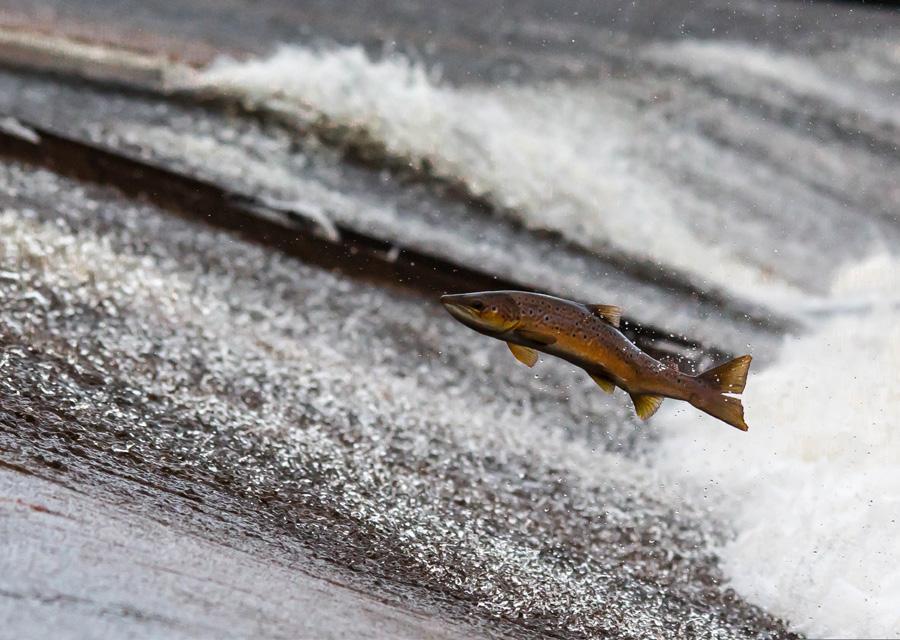
alizes that it has taken the wrong path and after showing her tested patience she sets off towards the right path. No matter how much it has to swim against the waves, it only rests when it reaches its original place. The mystery of a snake-like fish called an Eel is even more difficult. When this fish reaches puberty, it migrates from whatever river or stream it is in. These fish travel thousands of miles from Europe to the North American island of Bermuda, where the ocean’s estimated depths are exceeded. There, these fish give birth to more fish and then die. New-born fish that have no more knowledge than that their surroundings are filled with water. They embark on their return journey and not only return to the shore from which their predecessors came, but also find the river or stream from which their predecessors began their original journey. Thus, this snake-like fish is found in all types of water. The snake-like fish of the American coast is never found in Europe. Similarly, it is impossible to find the snake-like fish of Europe in American waters.
Nature has made such an arrangement that the European snake-like fish reaches puberty a year later than the American snakelike fish, and this is simply because it has a longer journey ahead of it.
When a black hornet subdues a locust, it
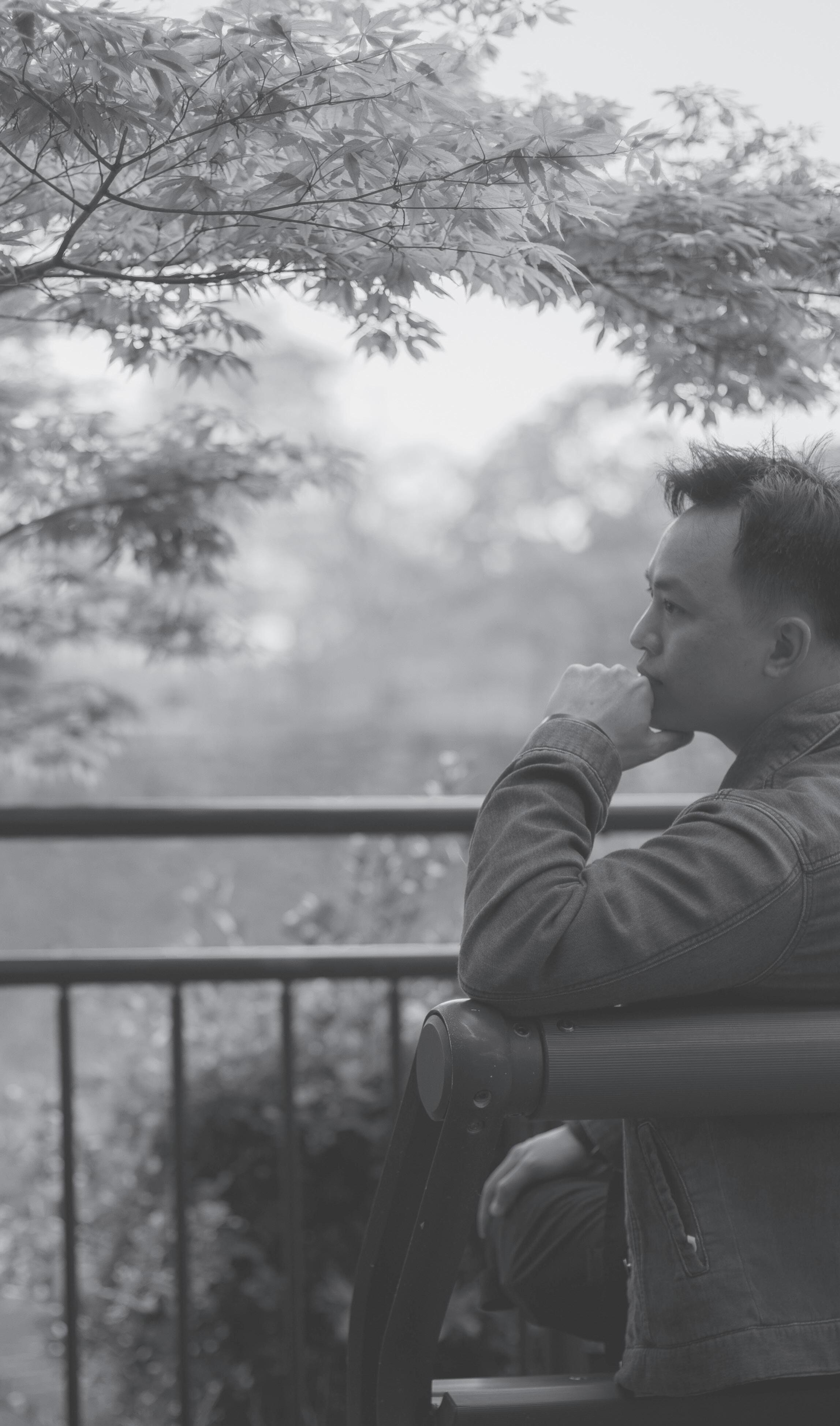
has to dig a hole in the ground and bite the locust with its mouth in exactly the right place so that it does not die but enters in a semi-dead state. So, the black hornet preserves it as living meat, then the hornet starts laying eggs so that when the babies are born, they can have something to eat. If that same meat had reached the point of being completely dead and the children had eaten it, their death would have been certain. After that, the female hornet flies until death overtakes her and she never sees the faces of her children again. Explaining such upbringing by saying that “circumstances” teach the black hornet to do this can never be proven correct, because the ability was bestowed upon it at birth.
Fourth: There is one quality in man that is more than instinct, and it is related to the ability to persuade others after discussion. No animal has the ability to calculate in numbers. Instinct has a limited kind of special beauty within it. The example of instinct is like taking a single note from a melodious flute. However, man has been given a mind that is like an orchestra in which all the strings of the musical instruments played must be in harmony. There is no need to explain this point much, because man can think about such possibilities with the help of logic. We are what we are simply because we have been given a spark from the powerful intelligence that dominates the universe. (The second part will be published in the next issue)
Mirza Harris Ahmad
National Secretary Waqf-e-Nau USA
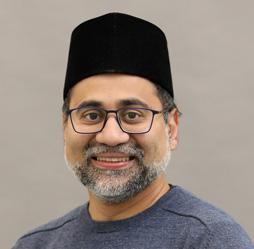
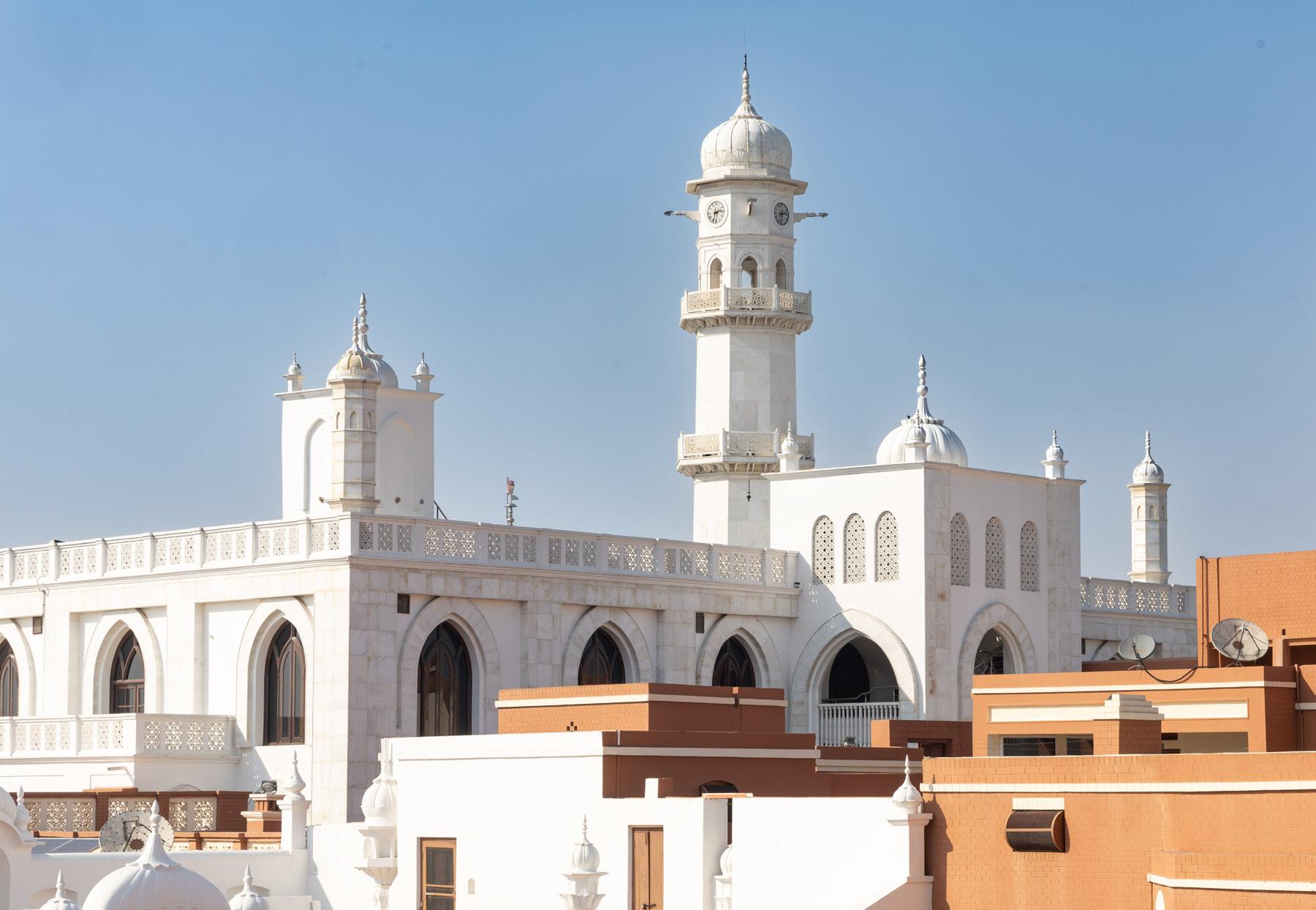
A Historic Trip: Waqf-e-Nau USA Visits Qadian
By the grace of Allah and under the prayers and guidance of our beloved Imam, Hazrat Khalifatul Masih Vaa, the Waqf-e-Nau USA Department, in collaboration with Majlis Khuddamul Ahmadiyya USA, embarked
on a historic and spiritually transformative visit to Qadian, India, from November 21st to December 1st 2024. This journey, filled with spiritual reflection and deep historical significance, reconnected participants to the very roots of their faith and the legacy of the Promised Messiahas
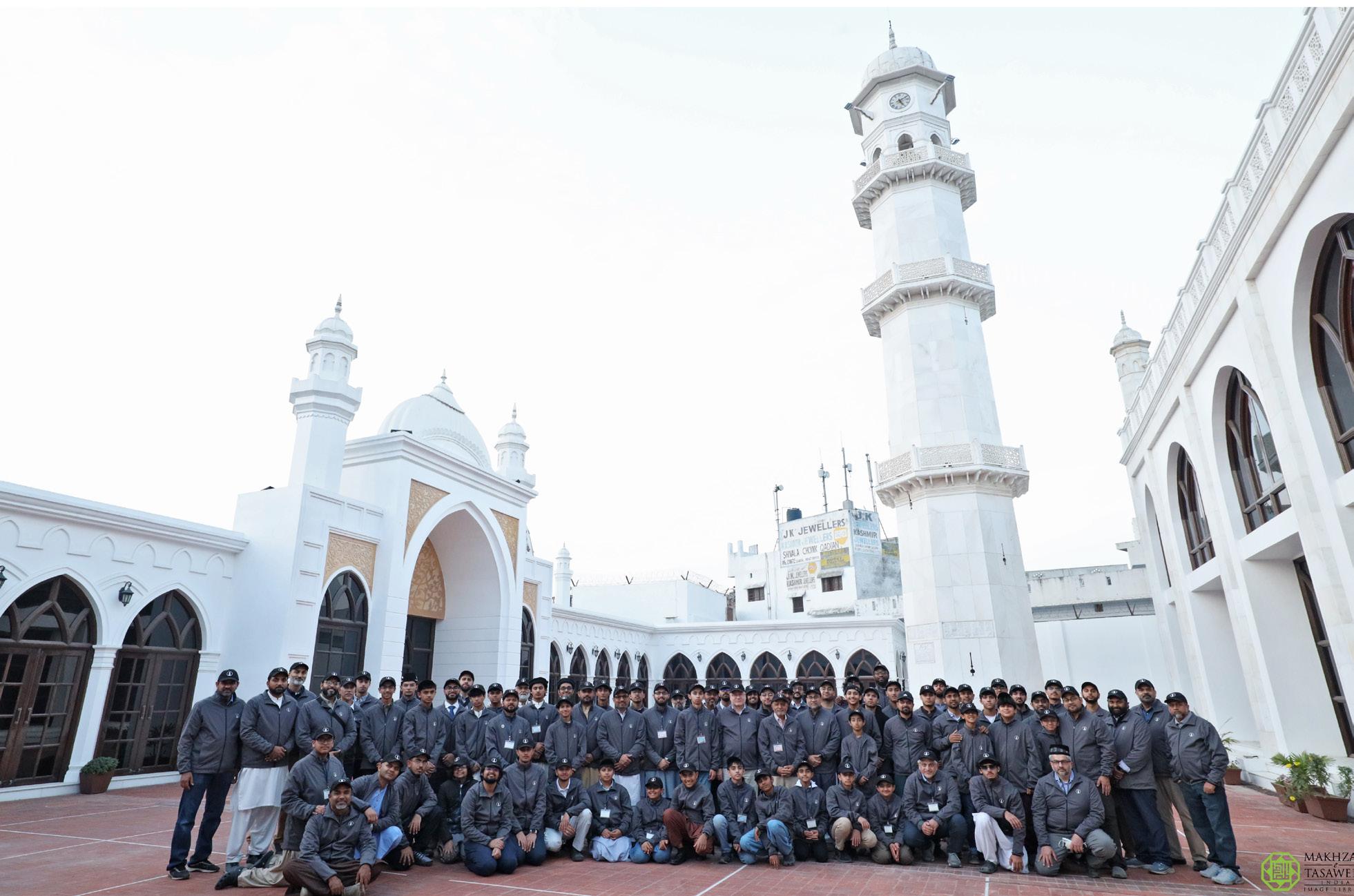
This report captures the objectives, activities, and experiences of the 78-member delegation that visited Delhi, Agra, Ludhiana, Hoshiarpur, and Qadian.
Receiving Hazrat Khalifatul Masih V’saa gracious approval for the trip marked the beginning of an intense planning process. Registration was open for two weeks in the summer of 2024 and due to limited spots but an overwhelming interest, initially, only 100 participants, including Waqifeen-e-Nau, Atfal & Khuddam, chaperones, fathers (of some Waqifeen-e-Nau), and National Team members, were approved to travel. The youngest members of the delegation were at least 12 years of age. The final selection of 78 participants, including Waqifeen-e-Nau Atfal, Khuddam, and chaperones, was a testament to the enthusiasm of members eager to witness the sacred sites of Ahmadiyyat. The logistical challenges of getting Visas, flight arrangements, and
other travel hurdles were met with perseverance, prayers, and Allah’s grace, enabling the participants to embark on this life-changing journey.
From the start of the journey many groups dealt with adversity such as flight delays and cancellations. 20 members were stranded on a malfunctioning airplane for more than 7 hours, and connecting flights missed, some members spent over 36 hours in transit. But by the grace of Allah and the prayers of our beloved Imamaa, all arrived in Delhi safely to start the tour.
The delegation traveled through Delhi, Agra, Ludhiana, Hoshiarpur, and finally Qadian, each stop offering a blend of historical insight and spiritual significance.
The visit to Ludhiana was a deeply moving
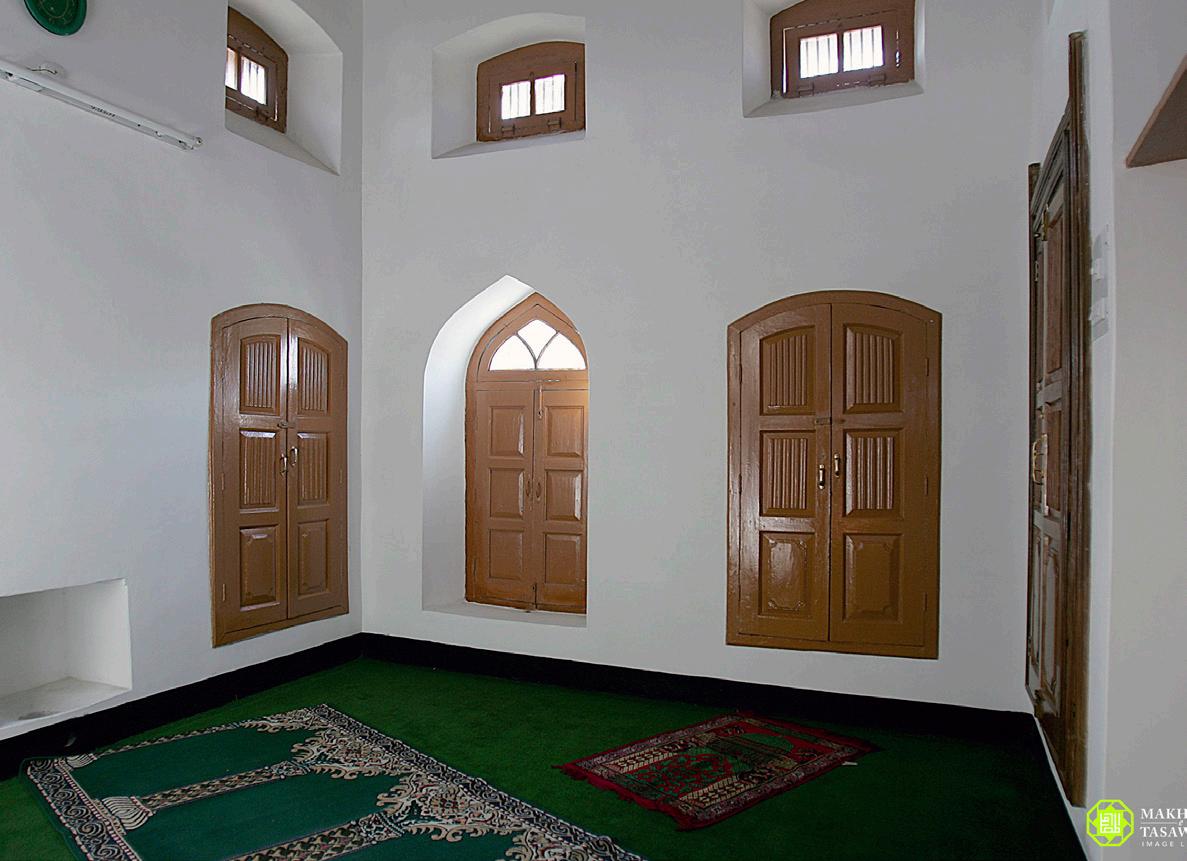
experience, as it marked the site where the first Bai‘at (pledge of allegiance) occurred on March 23rd, 1889. This moment was the foundation of the Ahmadiyya Muslim Community.
At Darul Bai ‘at, the sacred house of Hazrat Sufi Ahmad Jan Sahib where this historic event took place, participants were reminded of the immense significance of this spiritual milestone. The simplicity of the house belied the monumental event it hosted—the formal initiation of the Jama’at by the Promised Messiahas.
The participants offered Nawafil, Zuhr, and Asr prayers here, standing in the very room where 40 individuals took their first pledge of allegiance to the Promised Messiahas. Listening to the local missionary recount the historical details of that day, we felt the room fill with the spirit of sincerity and humility that must have characterised those early believers.
Hoshiarpur: The Prophecy of Musleh Maudra
Hoshiarpur holds a unique place in the history of Ahmadiyyat as the location of the Prophecy of Musleh Maudra. In January
1886, the Promised Messiahas entered a period of 40 days of spiritual seclusion in a small, simple room to devote himself entirely to prayer and worship.
It was in this modest setting, surrounded by the serenity of Hoshiarpur, that Allah revealed the prophecy of the Musleh Maudra, foretelling the birth of a divinely guided son who would spread the message of Islam to the corners of the world. This prophecy was fulfilled in the person of Hazrat Mirza Bashiruddin Mahmud Ahmadra, the second Khalifa.
Standing in that sacred room, we were struck by the contrast between its humble physical structure and the monumental spiritual event it witnessed. The delegation offered Nawafil, Zuhr & Asar prayers and listened to an inspiring historical account from the Local Missionary. The visit reminded us of the power of prayer and the unwavering faith of the Promised Messiahas in Allah’s promises.
The Heart of Ahmadiyyat
While getting closer to Qadian Darul Amaan, despite the fatigue from a long journey, the excitement began to spread throughout the two buses. The realisation awakened the group as everyone started looking out for Minaratul Masih.
Arriving in Qadian was the pinnacle of the trip. Known as Darul Aman (Abode of Peace), Qadian is not just a geographical location but the spiritual heart of the Ahmadiyya Muslim Community.
Upon arriving at the beautiful Sira-e-Waseem Guest House, the warmth of the welcome was unforgettable. Recent graduates and students of Jamia Ahmadiyya Qadian lined up outside, greeting us with chants of “یدمدآشخو” (Welcome) in Urdu and “ںنوںاباآجی” (You are most welcome) in Punjabi. Though strangers to us, their genuine smiles and enthusiasm instantly made us feel at home.
The guest house itself is a stunning blend of tradition and modernity - Spacious and beautifully designed, it features:
First Floor: A large atrium, Dining halls, a conference room, and a large foyer for mingling.
Second and Third Floors: Exclusively set up for our Waqf-e-Nau team from the USA, these floors housed all the trip’s guests in individual suites.
Bahishti Maqbarah: The Heavenly Graveyard
Bahishti Maqbarah, established under di-
vine instruction by the Promised Messiahas, symbolizes spiritual purity and self-sacrifice. The delegation visited this graveyard multiple times during their stay, each visit deepening their sense of connection to the Promised Messiahas and his companions.
At Qit’a-e-Khas, the special section reserved for the Promised Messiahas and his family, the participants recited Salam on behalf of the Holy Prophet Muhammadsa. This act of devotion brought to life the Hadith instructing Muslims to convey the Holy Prophet’ssa greetings to the Messiah.
Although it was 11 p.m., the atmosphere buzzed with the energy of a lively morning. After settling in, we collectively decided to visit Bahishti Maqbarah. The moment we stepped inside, a profound serenity embraced us. True to its name, the place felt like a piece of heaven on earth—peaceful, quiet, and filled with spiritual significance. As we approached the Qit’a-e-Khas, we paused at its fence to convey Salam to the
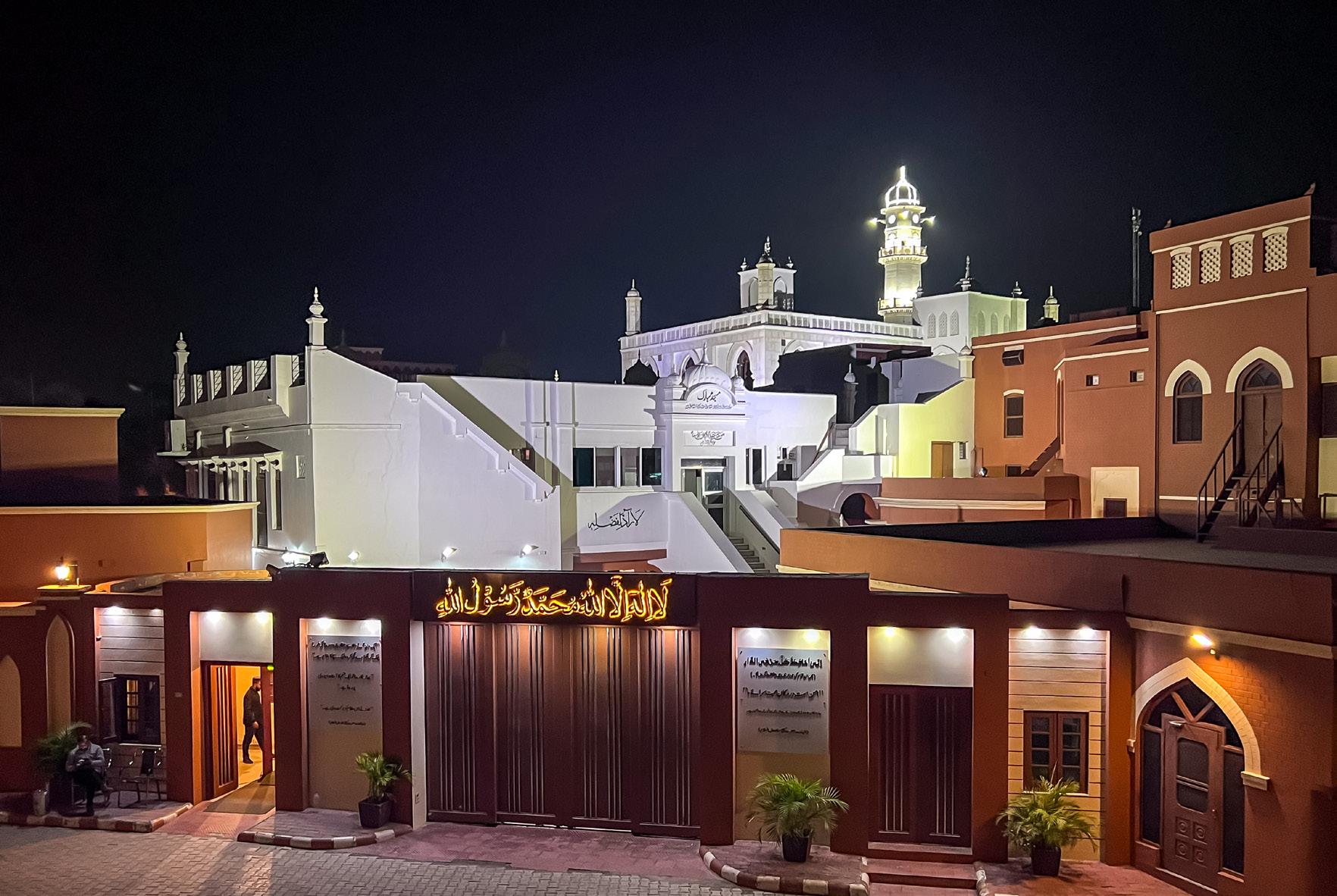
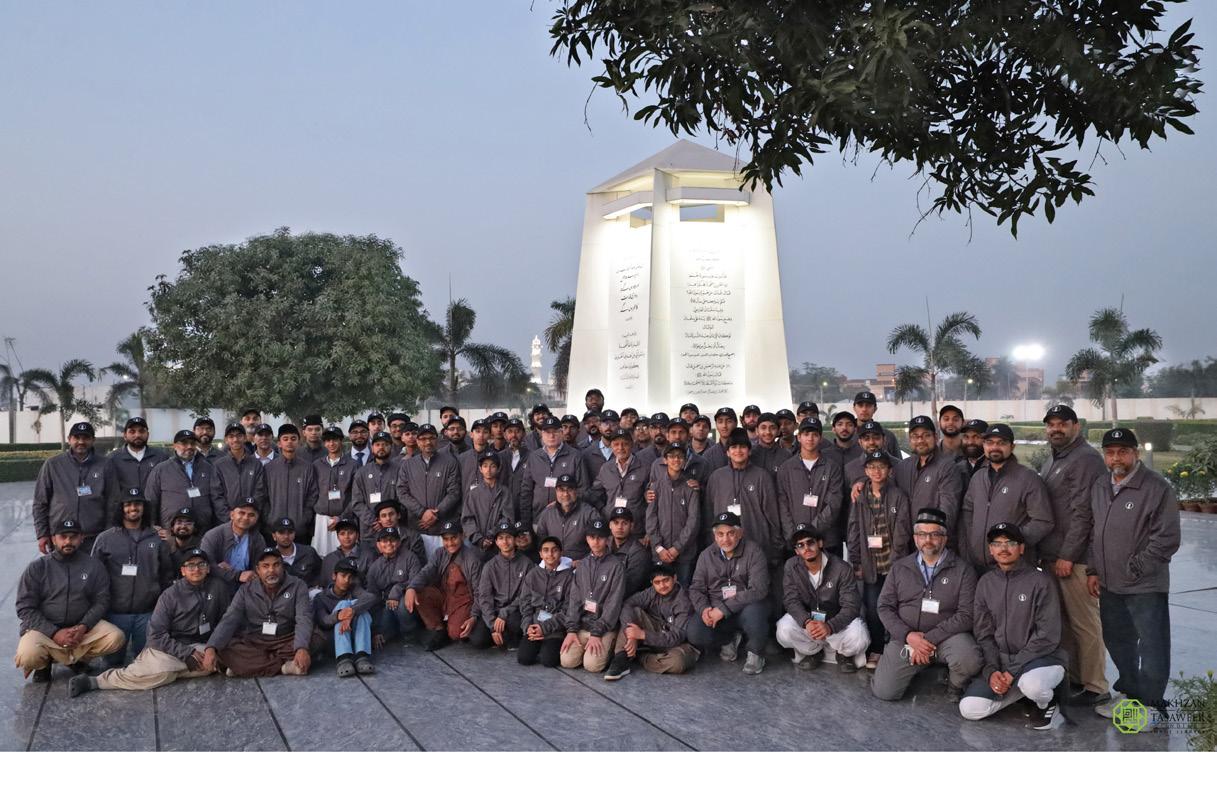
Promised Messiahas on behalf of the Holy Prophet Muhammadsa. This act beautifully fulfilled the hadith of the Prophetsa:
“Hazrat Thaubān relates that the Holy Prophet said: “When you find the Mahdī, perform Bai‘at (pledge of allegiance) at his hands. You must go to him, even if you have to reach him across ice-bound mountains crawling on your knees. He is the Mahdī and the Caliph of Allāh.”
Throughout the stay in Qadian, members visited the Bahishti Maqbarah multiple times a day.
The following few days, the delegation was divided into two groups and visited many sites of significance, of which a few are shared here:
Darul Masih: The Abode of the Promised Messiahas
Darul Masih, translating to “The Abode of the Messiah”, is an expansive complex encompassing the residence of the Promised Messiahas, his brother Mirza Ghulam Qadir’s house, the homes of his children, Masjid Aqsa, Masjid Mubarak, Bait-ul-Fikr, Bait-ul-Riazah, Bait-ul-Dua, the blessed
room where the Promised Messiahas was born & and much more.
These structures are intricately connected through walls, corridors, windows, and narrow alleyways, creating a labyrinthine layout. A central security gate serves as the primary point of entry and exit, unifying this spiritually and historically significant site.
In 2005, following the visit of Hazrat Mirza Masroor Ahmadaa, Darul Masih underwent renovations to preserve its traditional aesthetic while incorporating modern enhancements. The walls were refurbished using red-colored concrete, closely resembling the traditional red bricks or clay of the region. Doors and windows were painted in a dark, semi-gloss finish, creating a striking contrast against the earthy red tones.
• Masjid Mubarak, also known as Baitu-ulZikr, built in 1883, is the first ever mosque of the community where many divine revelations occurred and the nucleus of communal worship. Praying in this mosque, we felt surrounded by a profound spiritual aura, as though history itself was alive in the walls.
• Bait-ul-Dua, the room where the Promised Messiahas would retreat for private supplication, was a place of profound simplicity and devotion. Standing in this space, we reflected on the power of solitary prayer and its role in connecting with Allah.
• Bait-ul-Fikr, A notable feature of Darul Masih is Baitul Fikr where the Promised Messiahas used to write his books and spent
significant amounts of time in this room. Baitul Fikr also connects directly to Masjid Mubarak through a window. The Promised Messiahas would often use this window to enter the mosque and lead prayers, exemplifying the seamless integration of personal devotion and communal worship.
Masjid Aqasa & Minarat-ul-Masih - The Symbol of Victory
Masjid Aqasa was built by Hazrat Mirza Ghulam Murtaza, father of the Promised Messiahas and holds a significant history in our Jama’at. A special area within the Mosque is where the Promised Messiahas delivered the Khutbah Ilhamiyya - The Revealed Sermon on April 11th, 1900 in Arabic with the special help and support of God.
The towering Minarat-ul-Masih stands as a symbol of the Promised Messiah’sas divinely inspired mission to bring spiritual revival to the world in the courtyard of Masjid Aqsa. Its construction was divinely commanded and serves as a reminder of the light of truth emanating from Qadian.
Standing beneath the minaret, the delegation reflected on its profound symbolism—a beacon of hope, unity, and divine guidance for humanity.
Qadian is a treasure trove of spiritual and historical landmarks, each carrying immense significance for the Ahmadiyya Muslim Community. During their stay, the delegation visited numerous locations, immersing themselves in the history and legacy of the Promised Messiahas.
House of Hazrat Khalifatul Masih Ira
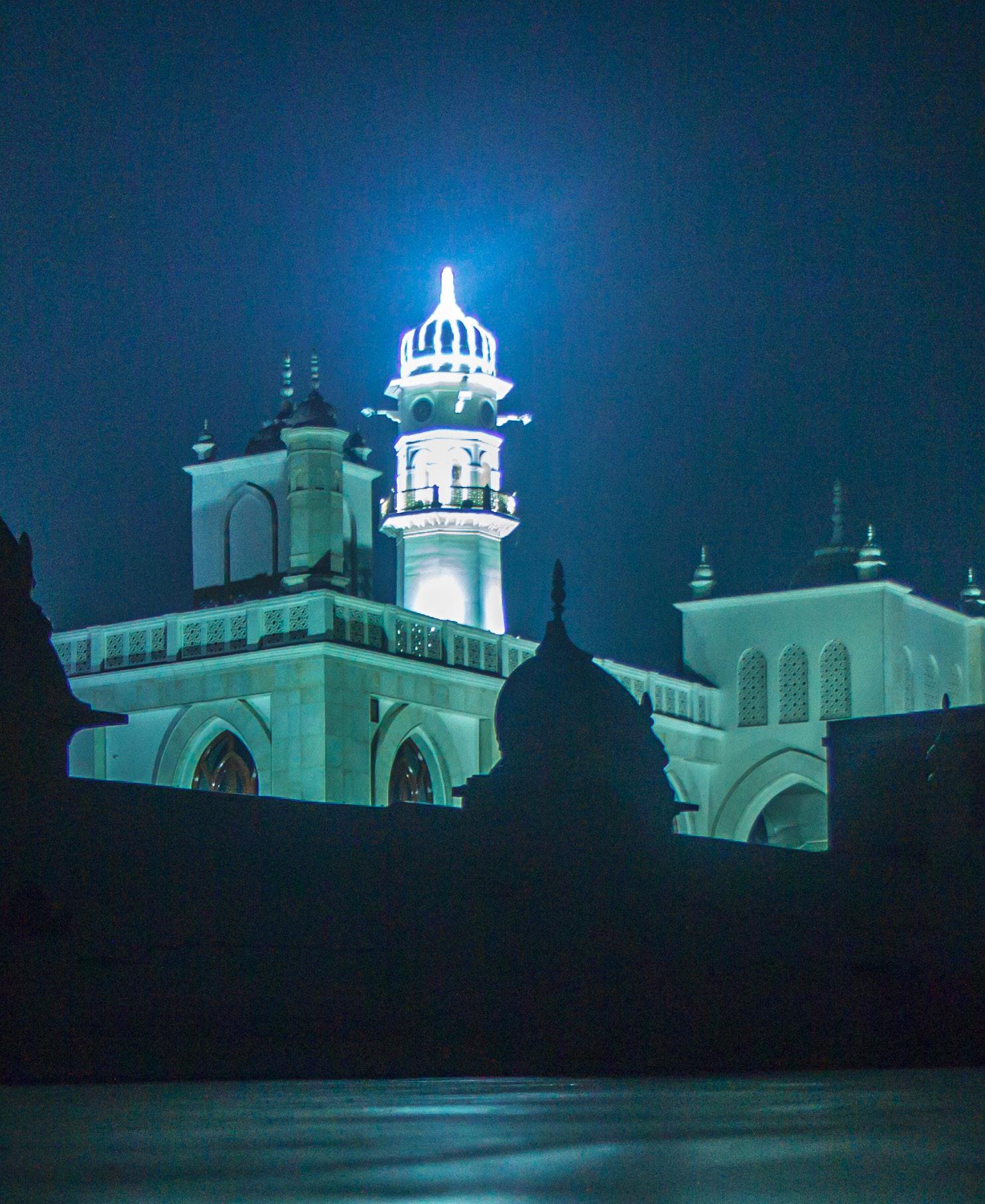
Makhzan Tasaweer
Quran Exhibition
Masjid Noor
Masjid Subhan
Masjid Masroor
Talim-ul-Islam School’s old building
Noor Exhibition
World Peace Exhibition
Langar Khana Hazrat Masih Maudas / Darul
Ziafat
Bookstore at Nizarat Nashr-o-Isha’at
Sara-e-Tahir / Jamia Ahmadiyya
Roti Plant
Fazl-e-Umar Press
Nooruddin Library
Noor Hospital
A deeply moving aspect of the trip was the opportunity given to delegation members to call the Adhan in Qadian. Adhans were called by Waqf-e-Nau boys and some other members of the delegation at Masjid Mubarak and Masjid Aqsa, marking a historical first for our delegation. Alhamdolillah.
“Every Ahmadi should be encouraged to visit Qadian at least once in their lifetime. Just as we encourage members to save and make sacrifices for attending Jalsa, or perform Hajj, one should also emphasize the importance of visiting Qadian. It’s that important, and it’s that life changing.”
“This trip has been an incredibly emotional experience, perhaps the most impactful of my entire life. It is simply beyond imagination to stand in the very place where the Prophet himself stood - not just any prophet, but the Buruz of the most beloved of Allah, Hazrat Muhammad Mustafasa. To feel your feet in the same place, and to prostrate in the same spot where the Prophet and Allah’s second most beloved person once did, is an overwhelmingly emotional experience. Every tear that falls feels as if it is coming straight from the depths of one’s heart, the feeling is truly surreal.”
“The peace and tranquility of Qadian provided a space for reflection and prayer, strengthening my bond with the roots of our faith. It felt as though the air itself carried the echoes of devotion, sacrifice, and divine love that define its history. This journey has left an indelible mark on my heart, inspiring me to carry forward the values and vision of the Promised Messiah in my own life. The peace and tranquility of Qadian provided a space for reflection and prayer, strengthening my bond with the roots of our faith. It felt as though the air itself carried the echoes of devotion, sacrifice, and divine love that define its history. This journey has left an indelible mark on my heart, inspiring me to carry forward the values and vision of the Promised Messiah in my own life.”
“Life-changing, a nice chance for spiritual satisfaction”
“My dream came true after visiting Qadian. It was my desire to visit Qadian which is completed. I should go there again inshallah.”
“My visit to Qadian was very special and very unique to me. The feeling when I arrived in Qadian was so exciting and I felt like I was at home. My experience helped me read Namaz on time and read the Quran more often.”
“So humbled and so grateful that Huzoor Aqdasaa allowed us on this trip and permitted us to visit the places we did. I would love for us to have permission to go every year and keep the fire alive. Life-changing!”
“My soul feels rejuvenated, and I am absolutely grateful for the opportunity to walk where The Promised Messiahas could’ve and pray where he prayed.”
“It really impacted me because normally my dad wakes me up for Fajr but now after returning home, I wake up before him. Also, I used to read the Holy Quran 4-5 times a week. Now I am reading it regularly.”
“I will truly miss seeing very young boys waking up in the middle of night, walking to Darul Masih and offering their Nawafil and Tahajjud before Fajr….. seeing a transformation in a matter of few days reminded me of the companions of the Promised Messiahas who used to come to Qadian for a few days and after a spiritual uplift, never wanting to leave Qadian.”
As the group departed Qadian, hearts were heavy, but spirits were high, carrying the light of faith back to their communities in the United States.
This trip was more than a journey—it was
a spiritual awakening. Each site we visited, from the historical landmarks of Delhi and Agra to the sacred grounds of Qadian, offered lessons in faith, sacrifice, and devotion.
The historical weight of Qadian’s landmarks and the legacy of the Promised Messiahas deepened my resolve to serve the Jama’at with renewed vigor. As I returned home, my heart was filled with gratitude for this transformative experience and the opportunity to walk in the footsteps of the Promised Messiahas.
May Allah enable all of us to stay steadfast in our faith and uphold the mission of the Promised Messiahas with sincerity and dedication.
Jama’at Ahmadiyya USA is extremely grateful to our beloved Imam, Hazrat Khalifatul Masih Vaa for his prayers and guidance at every step of the way. We are also grateful to the central office Wakalat Tamil-o-Tanfeez, Jama’at Ahmadiyya Bharat, and everyone who contributed and joined us in making this a memorable tour.
Mirza Harris Ahmad
National Secretary Waqf-e-Nau USA
Contributors:
Mirza Nabeel Ahmad Sahib, Anas Mangla Sahib, Saad Farid Malik Sahib, Ata-ul-Aleem Chaudhry Sahib
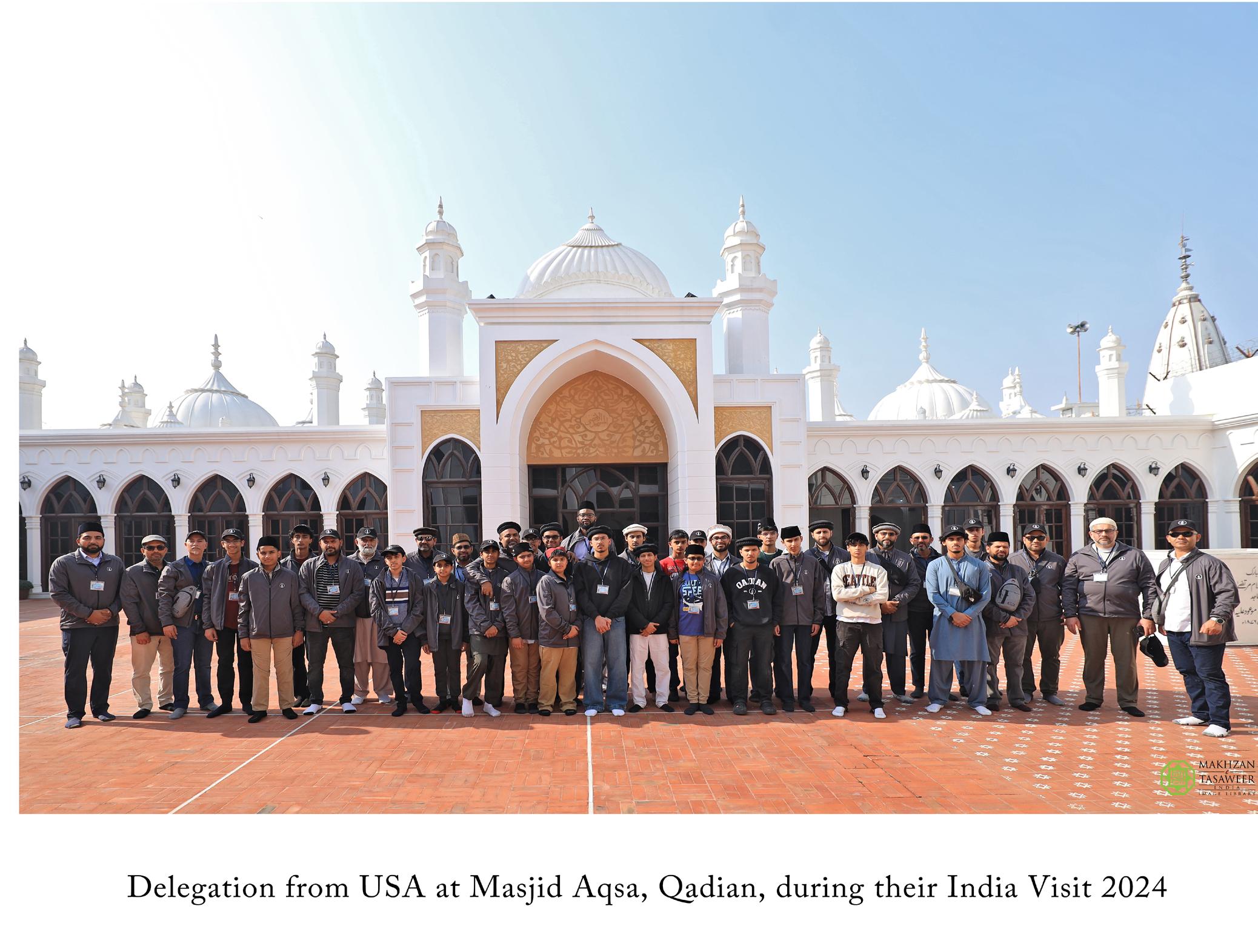

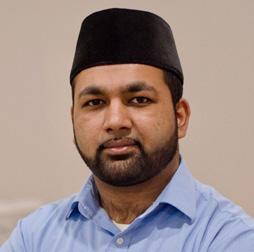
My name is Tariq Azeem, and by the grace of Allah I am part of the blessed scheme of Waqf-e-Nau. After completing my high school, I entered Jamia Ahmadiyya Canada. Upon completion, beloved Huzooraa appointed me as a missionary in Canada, where I served for five years. In 2019, Huzoor-e-Anwaraa subsequently appointed me as Sadr and Missionary In Charge Jamaica, where I have been serving for about six years.
•As a Waqif-e-Nau, why is it important to serve within the Jama’at and how can we instill this habit from a young age?
Waqifeen-e-Nau, especially the children, are the future of the Jama’at. One day they will shoulder great responsibilities, entrusted to them by beloved Huzooraa. To fulfill those grand tasks, Waqifeen-e-Nau have to be involved within the Jama’at from an early age. This will prepare them to carry out the greater responsibilities that lie ahead.
To instill the habit of serving the Jama’at, we must develop a love for the Jama’at in the hearts of Waqifeen-e-Nau. This can be done by encouraging them to watch beloved Huzoor’saa sermons and classes regularly,
sharing stories of the sacrifices made by our elders, and reminding them how Allah has blessed us and our families because of these sacrifices. When they understand the value of these sacrifices and see the blessings that come with serving the Jama’at, the desire to serve will naturally grow within them.
•What inspired you to become a Murabbi?
Growing up, I always admired the missionaries and the sense of peace and calmness reflected on their faces. There were moments when I considered becoming a missionary, but initially it seemed too challenging. Hence, I continued to plan towards a university.
In 2004, while I was still in high school, beloved Huzooraa visited Canada for the first time. By Allah’s grace, I had the opportunity to regularly offer prayers behind him during this visit. During those blessed days in the company of beloved Huzoor, something changed within me, and I became convinced that I should dedicate my life to Islam. Alhamdulillah, two years later I enrolled in Jamia and Allah the Almighty helped set me on my path to become a missionary.
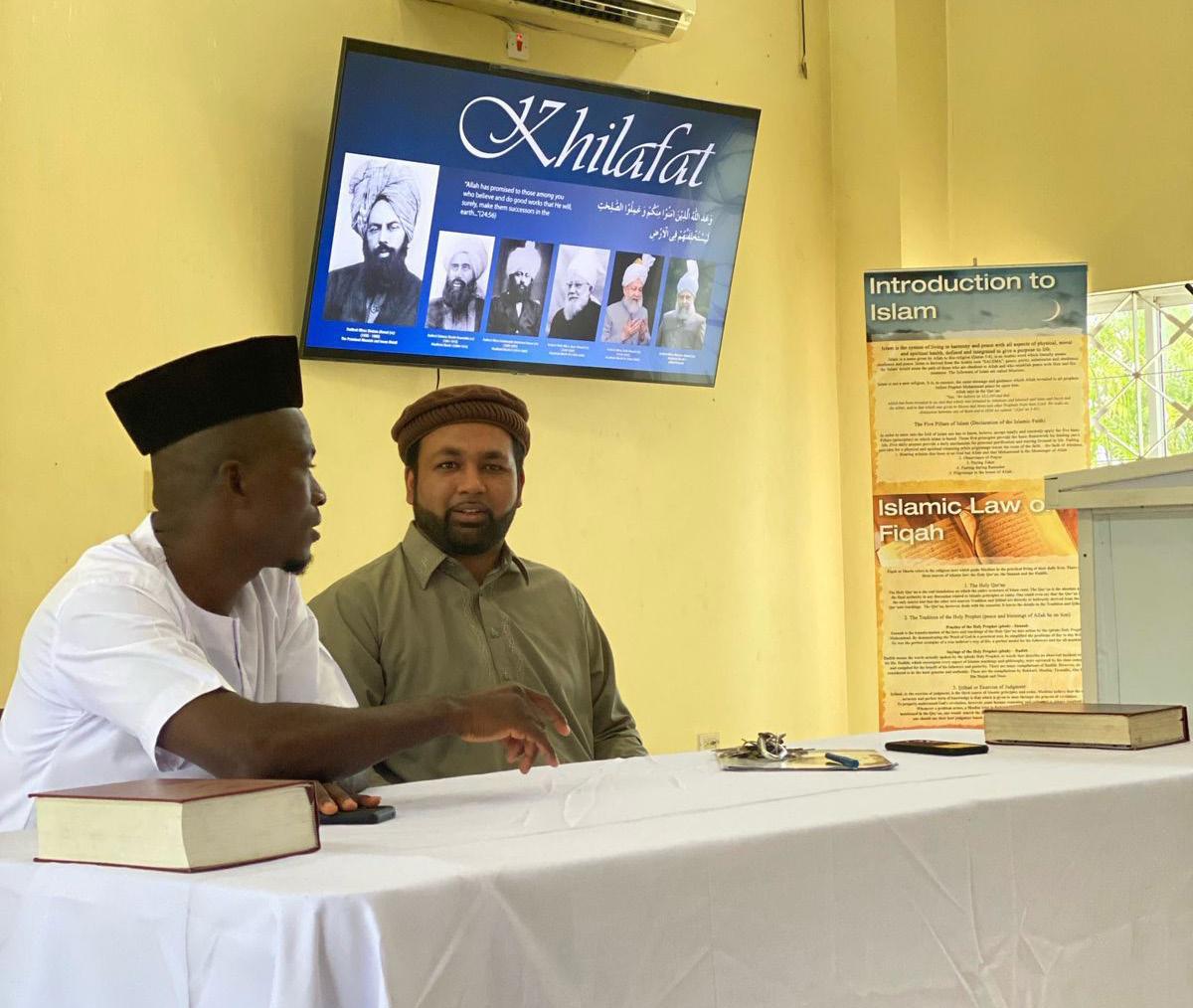
• Name three things that you experienced in your time studying in Jamia that changed you as a person.
First and foremost is developing a personal relationship with Allah the Almighty. One of the main reasons I entered Jamia was my desire to strengthen this relationship. Soon after I got admission, I began praying to Allah for various things, often in a manner that was more akin to “testing” if Allah heard my prayers. At the time, I was unaware of the proper etiquettes of prayer, and I later learned that my approach was wrong. Yet, to my amazement, Allah fulfilled every one of my prayers. This instilled a firm belief in my heart about the existence of Almighty Allah, and truthfulness of our Jama’at.
Secondly, the love and affection one receives from beloved Huzooraa while stud-
ying in Jamia is beyond words. When we dedicate ourselves fully to the cause of the Jama’at, we not only attract the love of Allah but also that of His chosen servants. During my Jamia years, every time beloved Huzooraa visited Canada or I had the opportunity to visit the UK, I was blessed with a personal or a group Mulaqat with Huzooraa. These moments of nearness to Huzooraa were possible because of being a Jamia student and remain a source of inspiration for me.
Thirdly, the brotherhood in Jamia played a significant role in my personal growth. Preparing with other students for exams and assignments, playing sports, planning trips to different places, and engaging in deep conversations on religious topics created a bond with fellow students that I often reminisce about. These experiences helped me grow not only spiritually but also as an individual.
• What advice would you give to Waqifeen-e-Nau who want to join Jamia Ahmadiyya and how can they prepare themselves?
Besides performing our daily prayers and reciting the Holy Quran, it is crucial to listen to the words of beloved Huzooraa. Becoming a missionary means becoming a soldier of Allah the Almighty, and beloved Huzooraa has been appointed as the general of this spiritual army. Therefore, to fulfill our obligations, we must pay close attention to Huzoor’saa guidance and reminders. Personally, I have always enjoyed Huzoor’s classes and programs such as ‘This Week with Huzoor’. They provide me with the motivation I need to fulfill my religious obligations.
• Where are you posted now and what is your daily routine? Also, how have you found the people of Jamaica and their food and culture? Are they religious?
Since 2019, I have had the honour of serving on the island of Jamaica, located in the Caribbean Sea.
The people of Jamaica are remarkable. The more time I spend here, the more I admire their culture and rich history. Due to their painful past marked by slavery, they have endured so much hardship. However, over the years, the nation has transformed itself, producing some of the brightest minds and the famous athletes around. This shows the resilience of Jamaicans.
Jamaican cuisine is equally fascinating, as it is a blend of West African, European, Indi-
an, and Chinese cuisines. When you study the history of Jamaica, you realize how various ethnicities have formed the culture of this island overtime.
Jamaica is a deeply religious country. Most formal gatherings and events begin and conclude with a prayer. On Saturdays and Sundays, people actively participate in church activities. However, when it comes to practicing their faith, there is often a significant disconnect. They have either forgotten the teachings of the Bible, or in reality give no importance to it. As an Ahmadi Muslim, it pains me to see how they love Prophet Jesusas but hardly follow his teachings.
This highlights the importance of our work. To save people from spiritual and moral decline, we must proactively invite them to Ahmadiyyat – the True Islam.
•Can Waqifeen-e-Nau take part in Waqf-e-Arzi in Jamaica?
Yes, of course. Over the years, many Waqifeen-e-Nau Khuddam have come here to assist us in our activities. Jamaica Jama’at is still very young and seeing such dedicated youth is truly inspiring for our local members.
Whenever we have groups visiting for Waqf-e-Aarzi, we carefully plan the schedule to make sure they have a fulfilling and an enriching experience. This includes participating in Tabligh and Tarbiyyat programs, engaging with Jamaican culture, trying local foods, and visiting sightseeing places. Alhamdulillah, within a short period, they are able to gather countless blessings.
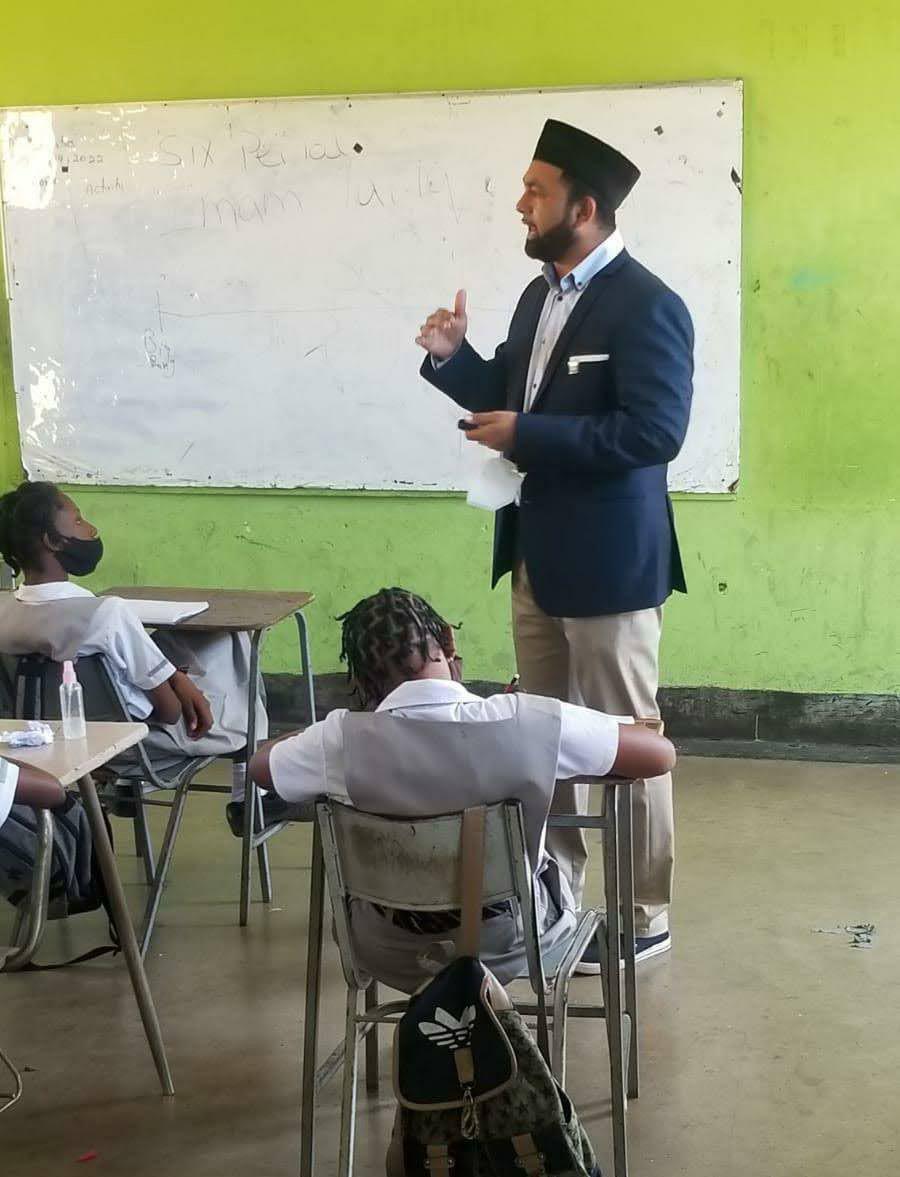
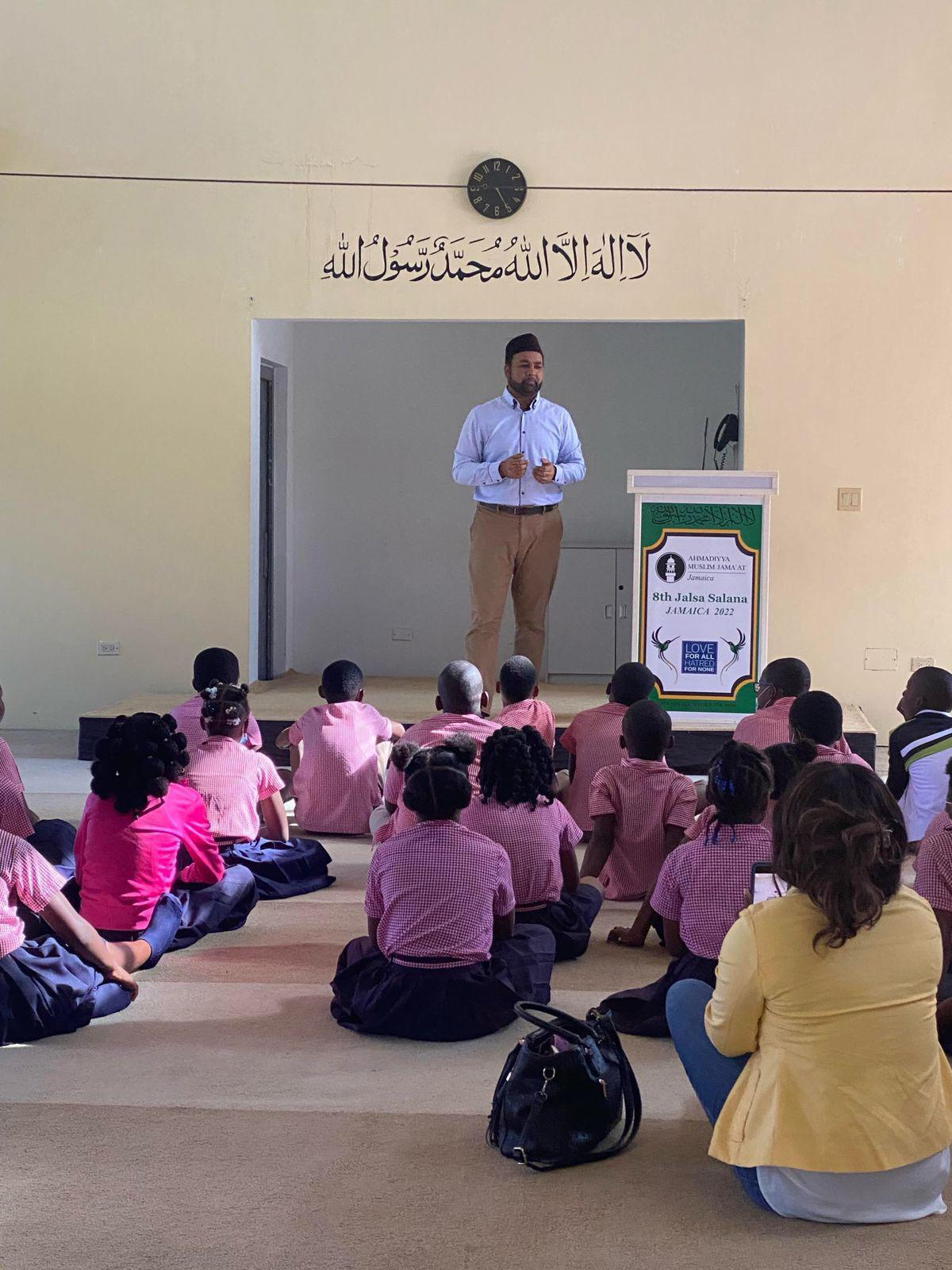

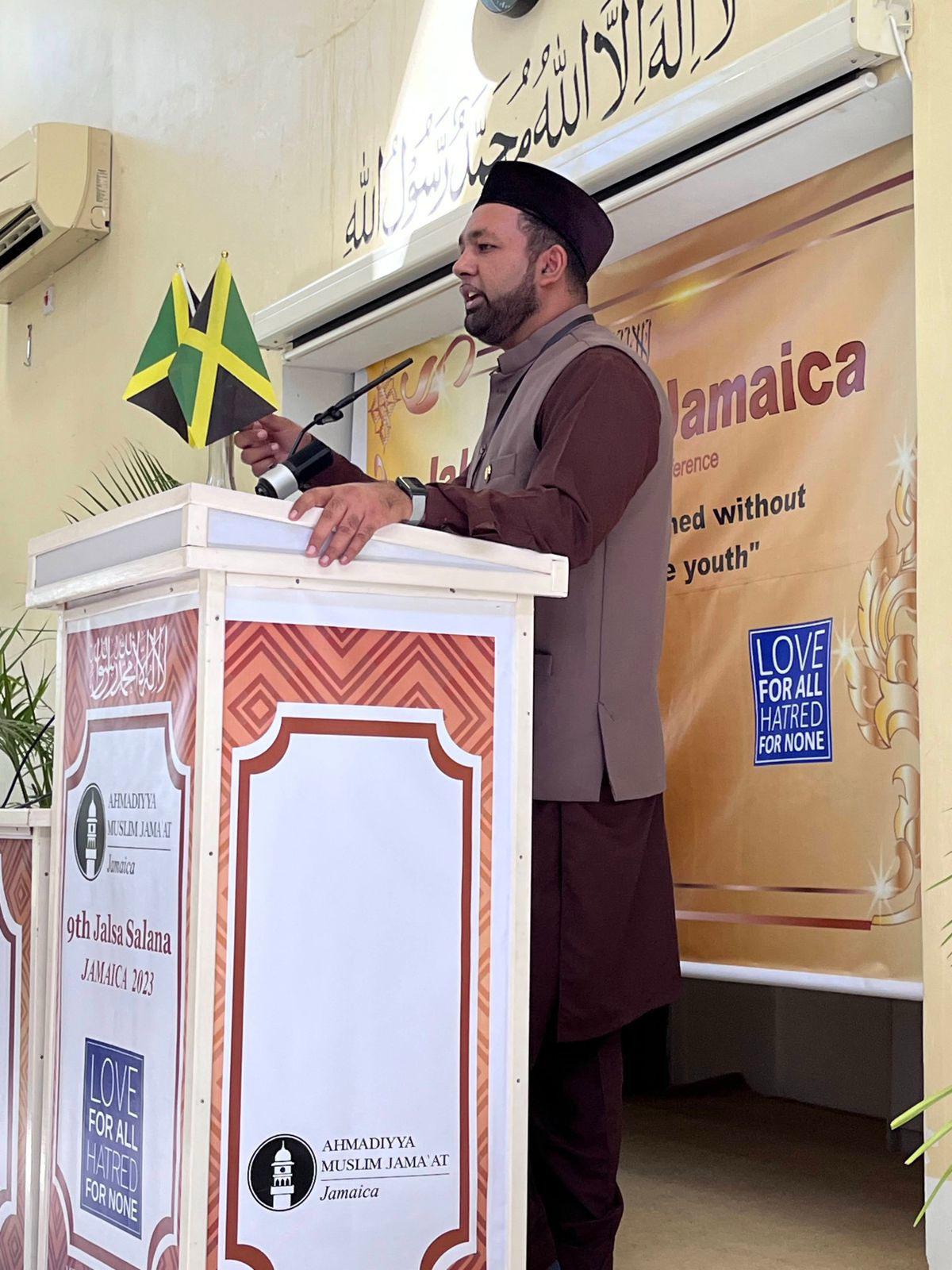
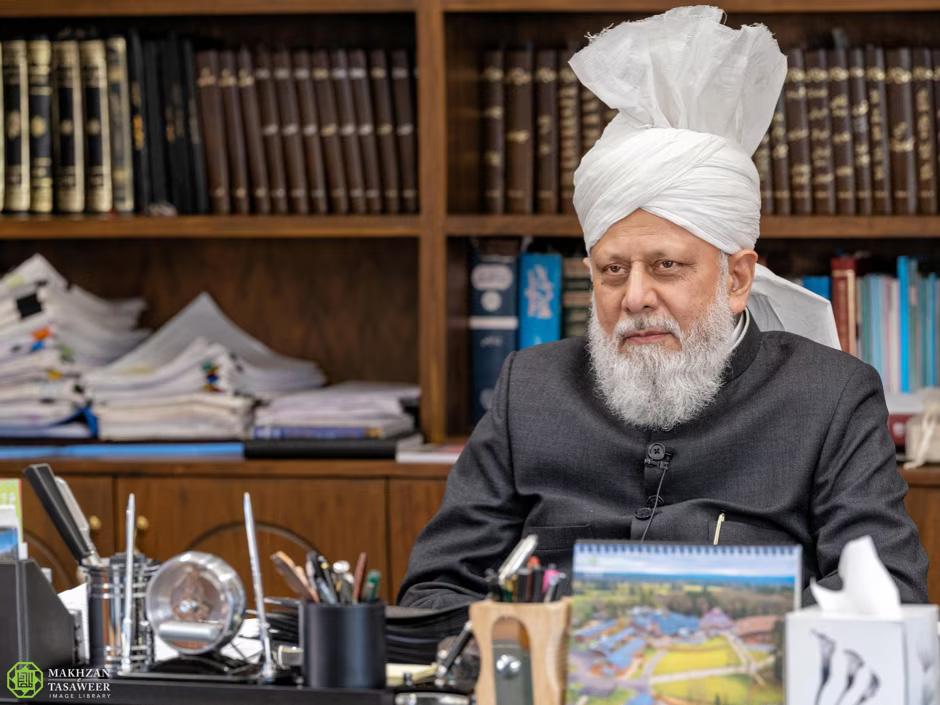
• Describe some of your challenges serving as a Muballigh in Jamaica and how have you tackled them?
Adapting to a new environment always takes time. I have had my fair share of challenges in this regard. There were moments when I felt worried about certain tasks. But those are the moments that make you realise that you have to trust Allah the Almighty, and remain steadfast.
Now whenever I face any challenge, I write to beloved Huzooraa for his guidance and prayers; and I request other members to pray also. Then we trust Allah and proceed forward. By the grace of Allah, all challenges just fade away.
• What are some of the guidelines from Hazrat Khalifatul-Masihaa to Muballigheen in propagating the message of Islam to the locals and how do you implement them?
Beloved Huzooraa has multiple times given us instruction to befriend the locals. He emphasized genuine love and care towards them. Huzooraa once stated that their culture is very different and expecting that they will transform overnight is not right. You have to work with them politely. Huzooraa said: if you show them love and affection, they will draw towards you. But if you are strict, they will move away from you.
I have personally seen this happen. Anytime you express love, and dedicate time to see them regularly, they are drawn to the Mosque.
• Please share some personal stories or moments you had with Hazrat Khalifatul-Masihaa?
By the grace of Allah, I have had several blessed opportunities to be in the company of Huzooraa. By far my most memorable time was when Beloved Huzoor visited Lloydminster in Canada to inaugurate Baitul Amaan Mosque. I was serving as a Murabbi-Silsila in the Jama’at. This allowed many close interactions with Huzooraa where he shared guidance and instructions regarding various matters.
I remember after Fajr prayer during his stay in Lloydminster, beloved Huzooraa asked me if we had invited our neighbors to the inauguration event. I replied: Huzooraa , we have only invited the dignitaries. Huzooraa instructed that neighbours have the first right; they should be invited as well. To obey the instructions of Huzooraa, that same morning we formed a team to visit the entire neighborhood and invite them to the event. By the grace of Allah, more than a few neighbors attended the event – but following the directive of Huzooraa , our visit left a very good impression on our neighbours.
In a recent mulaqat with Huzooraa, I asked: Huzoor how do we know if you are happy with us? Huzoor replied saying, ‘you should worry about making sure Allah Ta’ala is happy with you. For this you should offer Tahajjud prayers and fulfil your other obligations towards Him. If He is happy with you, why wouldn’t I be?’
• In this issue we are looking at the revelation of the Promised Messiahas “I shall humiliate him who designs to humiliate thee” can you share any faith inspiring incident relating to this revelation.
There are many instances where Allah the Almighty humiliates those who wish to humiliate the Jama’at, sometimes even through individuals who are not formal members.
In Jamaica, there is one sister who has been under Tabligh for 2-3 years. Coming from a Christian background, she initially struggled with our concepts that did not align with her beliefs and would leave our classes in frustration. Yet something about Islam continued to draw her back, and she kept learning.
Once, when a Sunni Muslim relative of hers tried to convince her to cut ties with the Jama’at, she confidently refuted his arguments and left him speechless.
Similarly, a staunch Christian once praised Jesusas as divine before her. She objected and presented the Islamic teaching of the Oneness of God. She said that only Allah alone deserves such praise. The man was so surprised and he distanced himself, almost as if he feared her. But she continued to disprove his claims using arguments she had learned from our classes. Unable to respond, he realized he could not counter the truth of Islam. So, very often Allah the Almighty sends His helpers, who are not yet part of the Jama’at, to humiliate our enemies.
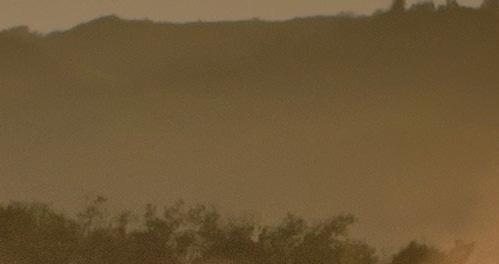
(Official Urdu transcript published in the Al Fazl International, 7 December 2024. Translated by The Review of Religions.)

On the 15th November 2024 Hazrat Khalifatul Masih Vaa lead the funeral prayer of Mr. Shehryar Rakin, in his Friday sermon he stated:
“The first mention is of Shehryar Rakin, (Waqf-eNau number: 8995B) son of Muhammad Abdullah Wahab Sahib of Bangladesh.
It has been written about this incident that considerable unrest has persisted in Bangladesh in recent days since the government was deposed on 5 August. When the government was deposed, chaos erupted throughout the country, and the opponents of the Ahmadiyya Jama’at also seized the opportunity to launch an attack on the Community in Ahmadnagar. Attacks
had occurred here previously as well. The opponents were setting fire to Ahmadi homes and then proceeded to set fire to the mosque. Following this, they proceeded toward Jamia [Islamic seminary] and the Jalsa site. While they were unable to enter Jamia, they approached from behind the Jalsa site and surrounded the volunteers tasked with the event’s security, continuing to assault them. It was during this assault that dear Shehryar sustained severe head injuries. After three months of treatment, he eventually succumbed to his wounds on 8th November and attained martyrdom at the young age of 16.
ue. Being the youngest son, his mother says he was a great help to her, assisting in the kitchen and cooking. He was very sociable, quickly befriending even strangers. His mother also noted that, like his elder brother, he was preparing to seek admission to Jamia. His mother also wrote that she saw dreams that informed her of the impending martyrdom of Shehryar before it took place.
[Surely, to Allah we belong and to Him shall we return.]
Shehryar was enrolled in the Waqf-e-Nau scheme. He is survived by his parents, grandparents, a sister, and two brothers. Ahmadiyyat was introduced into his family through his great-grandfather, Hazrat Munshi Sirajul Islam Sahib, who pledged allegiance through Allamah Zil-ur-Rahman Sahib, bringing many family members into the fold of the Ahmadiyya Jama’at. The deceased was also an active member of the Jama’at.
He was serving as the Secretary Mal in the amila of Majlis Atfal-ul-Ahmadiyya Ahmadnagar. His mother writes that he was steadfast in his prayers and worship from a young age, and showed the keenest interest in serving the Jama’at, even becoming upset if advised to focus first on his studies before participating. Whenever there was an Ijtema or Jalsa in Ahmadnagar, he would be the first to leave home and reach the ven-
The Qaid of Khuddamul Ahmadiyya in Ahmadnagar, Najmus Thaqib Sahib, states that last year in March 2023, during attacks that occurred at Jalsa, Engineer Zahid Hasan Sahib had been martyred, and I had led the funeral prayer for him and mentioned him in the sermon. He says that while the khuddam were on duty, they were having breakfast and listening to the sermon. During this time, Shehryar Rakin remarked that if he were to be martyred that day, his mention would also be made in the sermon. He writes in detail that when the assailants suddenly attacked on August 5th, this time, a large number of people were present to protect Jamia, while only around fifteen volunteers were on duty to secure the Jalsa site on both sides of the road. Shehryar joined them and participated vigilantly in the security efforts, assisting Qaid Sahib in all matters. Suddenly, the attackers barged in, breaking through the gate, and upon entering, raised slogans and began mercilessly beating the people with sticks, injuring many. Shehryar sustained the most severe injuries, particularly to his head. His lower body had become completely paralysed, which he expressed right there. Soon after, an army vehicle arrived, and with the military’s arrival, the assailants fled the scene, leaving the injured Ahmadis behind.
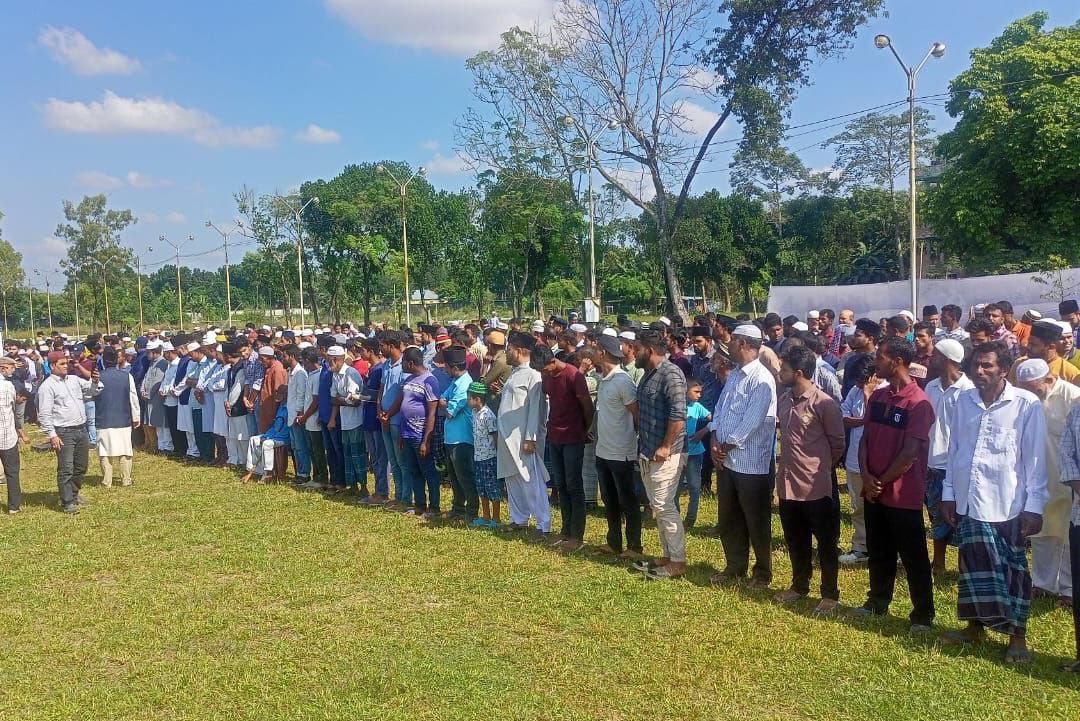
Qaid Sahib writes that Shehryar was always ready for duty and service. He actively participated in cleaning the mosque and other Waqar-e-Amal activities, and also engaged others in these efforts. He fulfilled the duty of waking people for the Fajr and Tahajjud prayers [pre-dawn voluntary prayers]. Zahir Sahib, a student in Jamia Bangladesh, writes that during Shehryar’s burial, he was on duty in the area of the Jalsa site. He asked a Khadim from Ahmadnagar who often played with him about any special qualities that distinguished Shehryar. The Khadim replied by referring to an exhibition that was held at the Jalsa in 2023 about the martyred Zahid Hasan. They were all viewing the exhibition when suddenly, Shehryar remarked, “I wish I too could have been martyred like brother Zahid, so that my picture would be here, and my mention would be made in the sermon.” They were greatly surprised to hear this from him. Allah the Almighty has fulfilled his desire.
The aunt of the deceased, Zeenat Fauzia, says, ‘He was the youngest of his brothers, and he listened to everyone and would help everyone in their work. On the day of the attack, when he was leaving the house, he said, ‘I must protect the mosque. If I am not able to, then I will be martyred.’ The deceased martyr set an example of sacrifice for his elders as well. May Allah the Almighty elevate his station and grant patience and forbearance to his parents and family. (Ameen)”
(Official Urdu transcript published in the Al Fazl International, 7 December 2024. Translated by The Review of Religions.)